You Can't Visit Bulgaria If You Don't Know These 50 Simple Tips
If you think that Bulgaria is just cheap drinks and beach, think again. Check out these 50 tips to make sure you visit Bulgaria as you should!
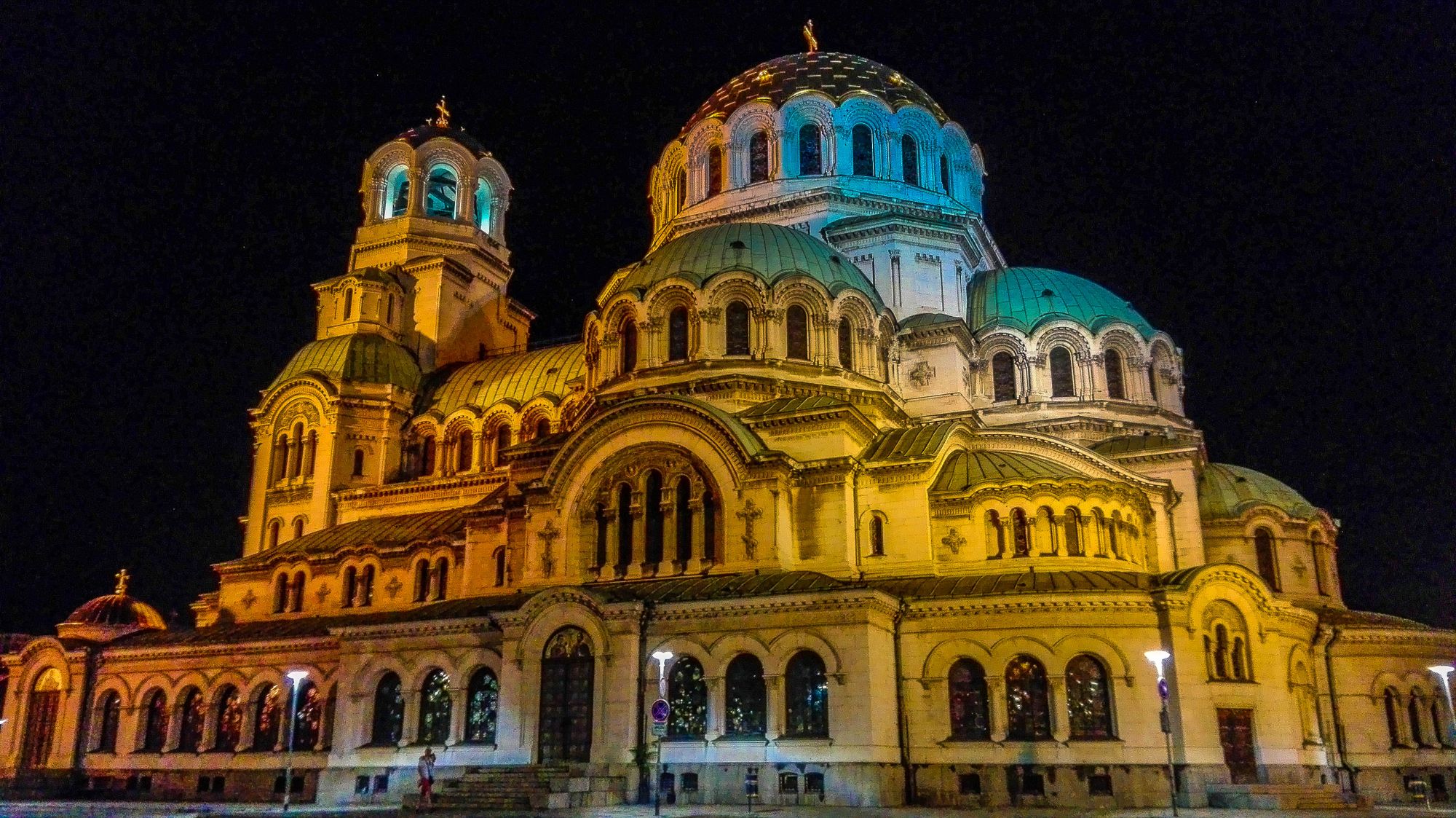
I was talking to a couple of tourists the other day in Sozopol while waiting for the pancake I ordered. At some point, I ask them what they think about Bulgaria.
Their opinion of the country blew my mind:
They said that the country had little more to offer than cheap drinks and touristic beaches.
Say what?!
After living for over 6 months with locals in Bulgaria helping people get a compensation for their disrupted flight and traveling around the country, I simply cannot agree with that (sorry).
That's why I decided to write this guide full of simple tips to visit Bulgaria the right way.
Yes, there is a right way. If you want to make the most of your stay there, that is.
Read these 15 general tips to visit Bulgaria the right way
1. Do NOT go to Sunny Beach
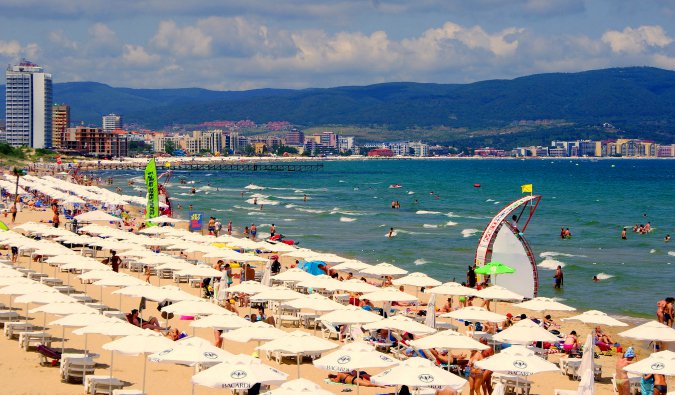
Source: Nomadic Matt, who also hates Sunny Beach
I have to start with this one. Each year, way too many tourists thirsty for Bulgaria's seaside go to Sunny beach... and come back disappointed.
Why is that?
The destination is incredibly overrated, super pricey (for Bulgaria) and touristic. It used to be a great place over 10 years ago, from what my Bulgarian friends tell me, but now, don't expect more than hundreds of beach chairs that leave no room for your towel, loud tourists who love to flash their money and water quality that is way below the standards of neighboring beaches.
The only reason you might want to go there is for the night life: parties last until the early morning, drinks are flowing and the music is loud. If that's your thing, dobre (okay, in Bulgarian), maybe you'll enjoy it.
Otherwise, keep reading to know which beaches are actually worth it!
2. Learn the basics of the Bulgarian language
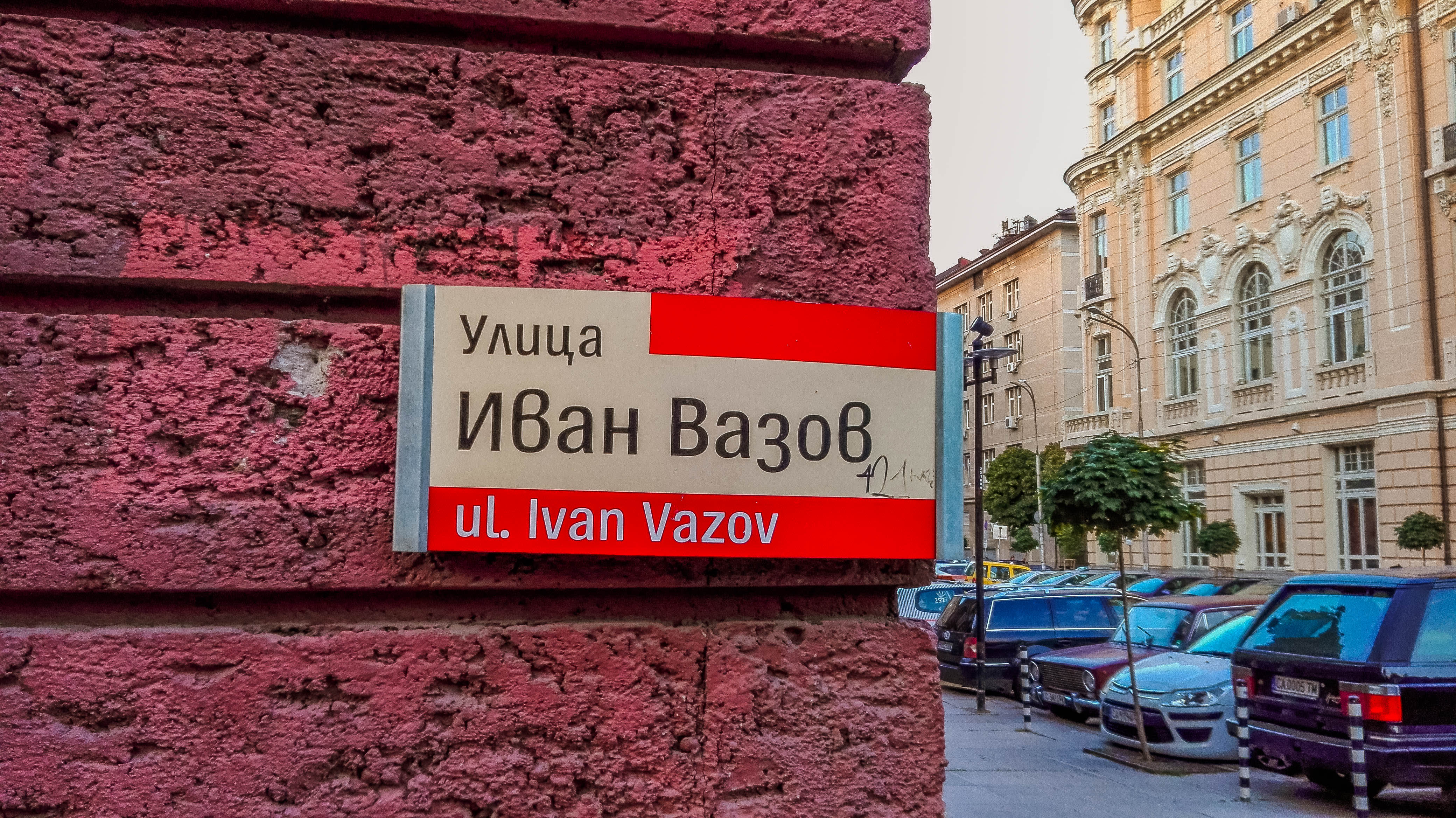
No matter where you go, I always believe it's a good idea to learn a few words of the local language. It shows that you're involved in your stay, the locals really appreciate it and it helps you get integrated more easily. These are only a few of the advantages of learning a new language.
If you want to visit Bulgaria the right way, I'd say it's a must. Except if you're visiting only the main touristic points (and that is NOT the right way), you'll quickly realize that overall, few people speak English. The young generation usually speaks English, at least enough to understand you and help you out. But for people over 40, don't have high hopes. You'll actually have better chances if you speak Russians with them!
The other reason is that the Cyrillic alphabet used in Bulgaria wasn't born in Russia as it is commonly believed. It was invented by Cyril and Methodius during the 9th century AD, in Bulgaria. And the country is very proud of it, they even celebrate it on May 24th.
Keep also in mind that a lot of signs don't have translations in Roman letters. That includes menus in restaurants as well. Knowing at least how to pronounce the letters would be a good start. I recommend that you use the Memrise app to get the basics.
Pro tips?
Learn a couple of funny expressions! Bulgarians you'll meet are sure to ask you if you speak the language. Telling them a funny sentence is a great way to break the ice. And when you bump into someone, don't say "sorry": say "opa"!
3. Don't be surprised by Bulgarian service in the restaurant
When people ask me what I find strange about Bulgaria, for some reason, that's the first thing that comes to mind:
When you go with friends to the restaurant, they will bring you the dishes as soon as they are ready, meaning that if someone orders a cold meal (like a shopska salata) while you want something from the grill (like kebapche), you're likely to get your meal quite some time after the first person was served.
It's not a big deal, far from it! Just don't be surprised and don't expect to be served at the same time.
4. Mind the sidewalk: it can be treacherous
Again, it's not really important, but I better warn you still. When you go to Sofia, you'll see that the city's small streets have a lot of trees. The city is rather green thanks to it and the many parks you can find there.
But here's the kicker:
The sidewalk is far from flat and several stones are unstable, making the walking experience somewhat challenging at times. Especially when it's been raining and ponds are hiding below the cobblestones, waiting for you to step on them.
And this is crazy:
A lot of Bulgarian women wear high heels. I mean, really high heels. They may have mastered the art of walking on the rigged sidewalk, but if anything, you should take it as a sign that you too can probably make it. Just mind your steps!
5. Learn how to squat like a boss
As illustrated by 9gag:
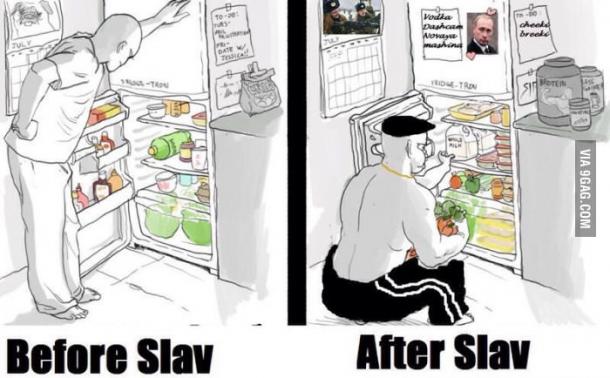
Between my trips to Bulgaria, I visited China. I saw a lot of people squatting in the street. Everywhere actually. For me, it doesn't make any sense. I find the position terribly uncomfortable.
But let me tell you that Bulgarians take squatting very seriously: I've been called a spy for not squatting the right way!
Let me explain:
To squat "like a real Slav", as they say, your heels are supposed to stay on the ground. That is the ultimate factor determining your squatting skills.
Bonus points if you wear a tracksuit. If you're addicted to 9gag, you might find the "Squating Slavs in tracksuits" Facebook page entertaining.
6. Yes and no: don't get confused
I was going to the restaurant just last week and one of my friends asked if they had a free table. The woman shook her head with a big smile. I figured that we had to look for another place, but my friend told me that they did have a free table.
That's something else that got me confused. It still does actually.
In most of the world, people shake their head when they mean "no" and nod to say "yes". Right?
Well, Bulgaria is apparently determined to stand out: if they shake their head "no", they actually mean yes. It's particularly disturbing when they say da (yes) while shaking their head.
7. Even if you're not a history buff, learn the main events of the country's past
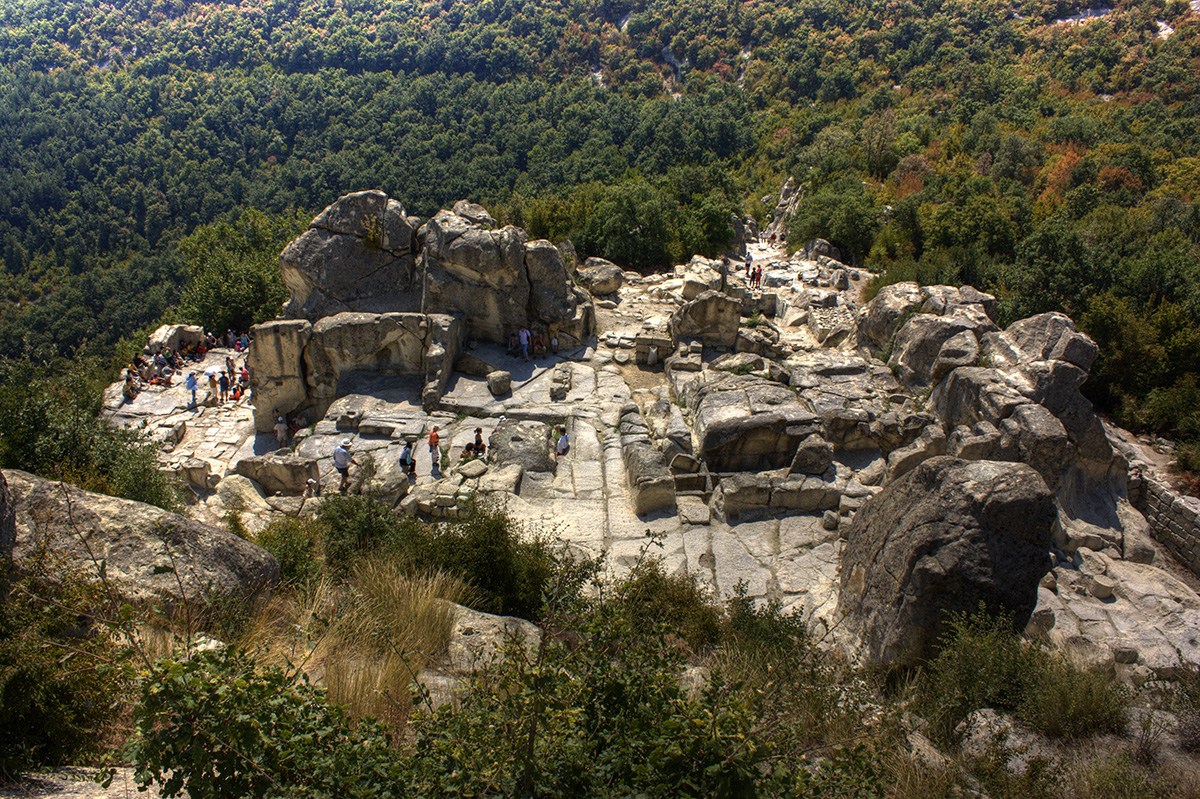
Source: Kashkaval Tourist
I understand you, I'm not really into History myself and have tremendous problems to remember dates and names.
But Bulgaria has a truly fascinating past, involving Thracians, Byzantines, Ottomans and so much more! Many places in the country bear the marks of the old days.
I swear it's worth looking into and it will give you the keys to the understanding of the current political state. Oh yes, Bulgarians love to talk about politics (about football as well). Especially to complain about politicians. My friends told me that many believe that someone of power is corrupt at some level...
8. Name days are taken seriously
Back in France, I think only my aunt remembers and give me a call for my name day. In Bulgaria, it's a big thing, sometimes celebrated just as much as a birthday!
If a Bulgarian tells you that today is their Name Day, make sure you congratulate them very warmly and avoid the "so what?".
Names, in general, follow specific rules in Bulgaria. From what I understood, the first name is the same as the paternal grandfather while the surname comes from the father, with a variation depending on the gender (for example, Mitokov for a guy, Mitkova for a girl).
9. Develop a taste for roses
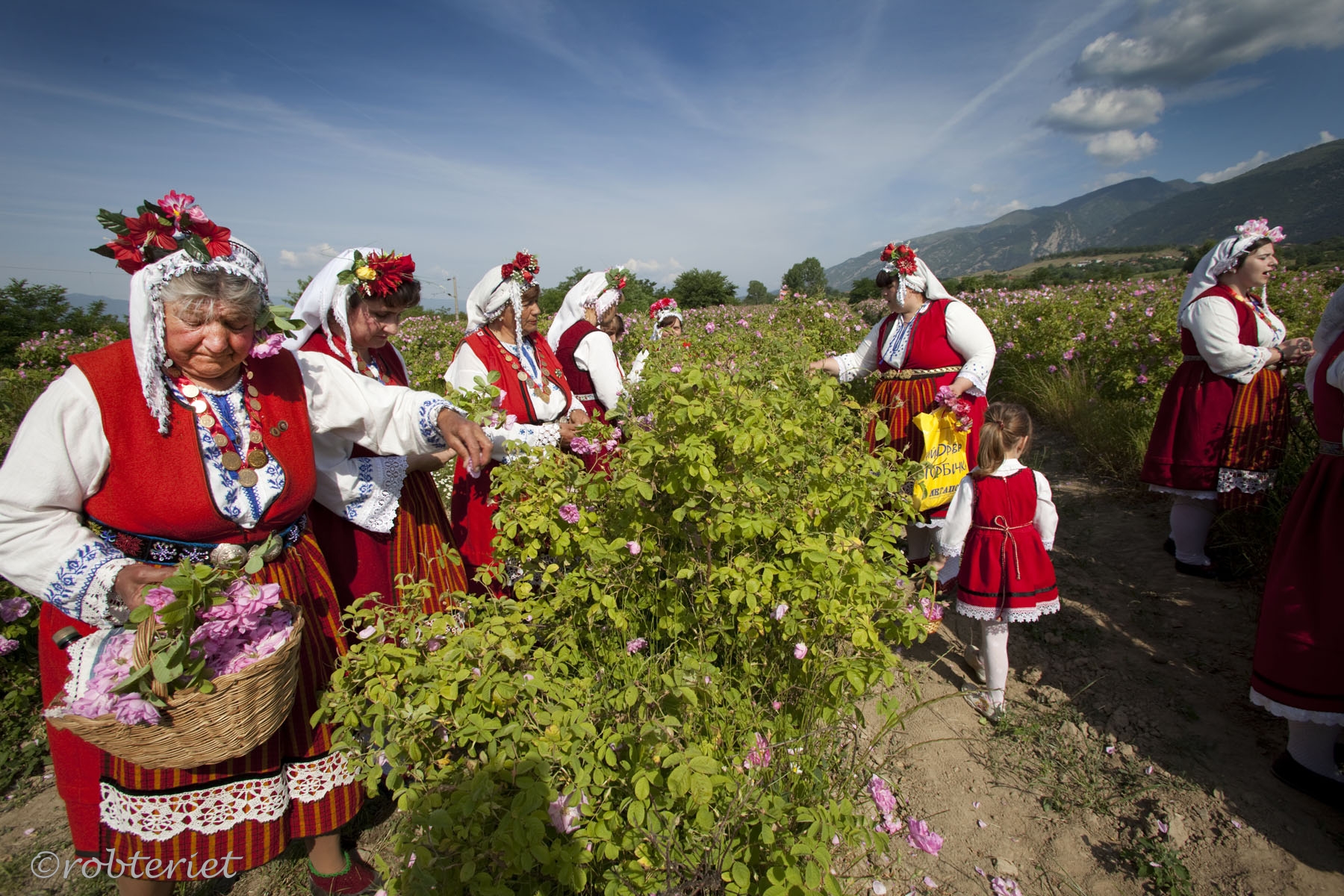
Not that you will eat them, but I guarantee that you will smell roses regularly. That's because Bulgaria is the main producer of rose oil in the world (over 75%!).
I'm telling you this in case you struggle to find a gift for your grandmother (or mother)!
If you want to see it first hand, head for the Rose Valley in the Kanalak region. I can't say I'm a flower person but that's something you don't get to see in many countries.
10. Don't forget to change money
Although Bulgaria is in the European Union, it is not part of the Euro zone. The country uses the Bulgarian lev (BGN), which exchange rate is about 1€ = 2 BGN.
Not that the conversion is really hard to calculate, you can still use the XE Currency app that gives you live exchange rates. Also useful if you're not thinking in terms of euros!
11. Always carry some cash with you
You shouldn't run into much trouble to pay by card in larger restaurants and touristic places, but again, this has nothing to do about visiting Bulgaria like a local.
That's why you should make sure to always have some cash with you. That's how you pay in most places and it really makes things easier.
12. Leave a tip
While we're on the topic of money: don't forget to leave a tip! The rules really vary from country to country, and while I've never managed to leave a tip in China, I would say that it's expected in Bulgaria.
Less than 10% of the bill is okay in restaurants. When you're taking a taxi, the driver will always round it up and take their own tip whether you want it or not. I never tip taxi drivers.
Here's something that might surprise you:
You should tip the guy at the gas station.
13. Don't remove the bracelets from the trees
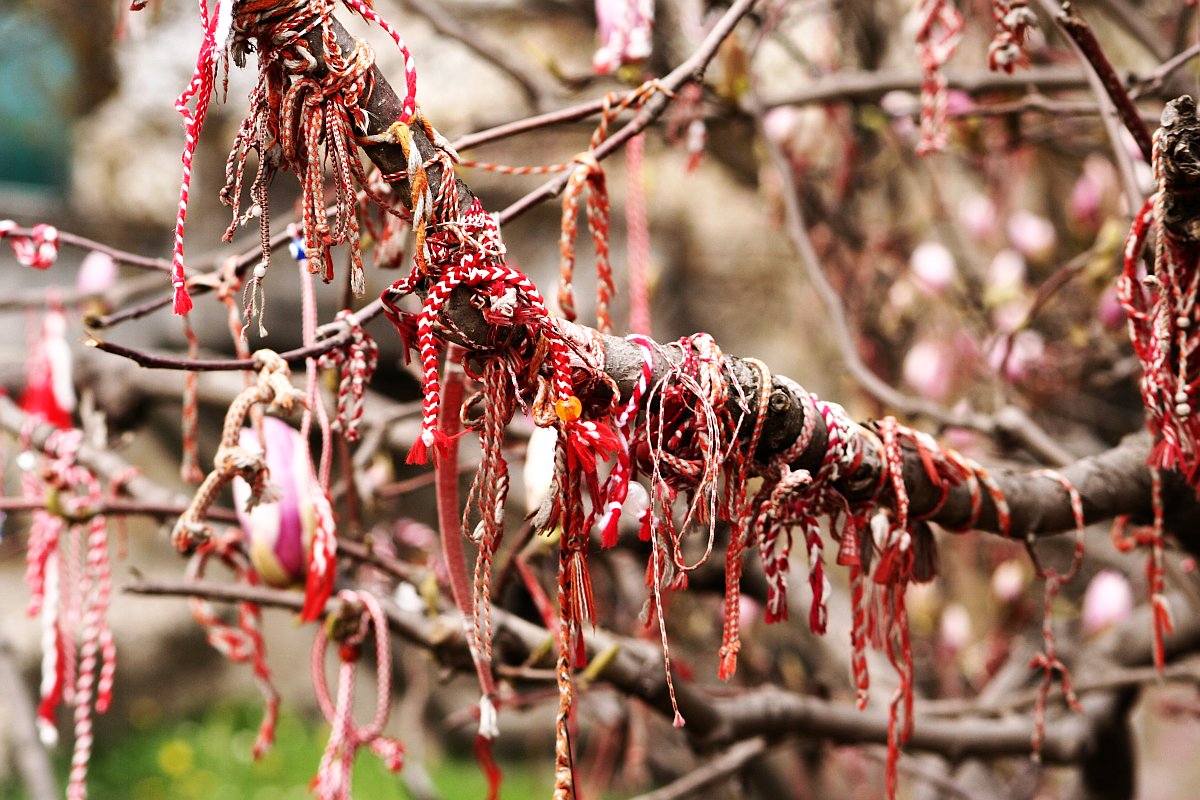
Source: The Culture Trip
On March 1st, Bulgaria celebrates Baba Marta. The date marks the welcoming of Spring that should come soon. On the occasion, people exchange bracelets made of intertwined red and white threads.
They wear the bracelets on their wrist until they see a blooming tree. Then, they attach the bracelet to the tree: it is believed to bring health, happiness, and fertility.
I love this tradition specific to Bulgaria and was very touched when I was offered the bracelets (called martenisa in singular form, martenisi in plural). A tip if you visit Bulgaria after the beginning of Spring: don't even think of taking the bracelets from the trees!
14. Beaching: yes. Skiing: yes too!
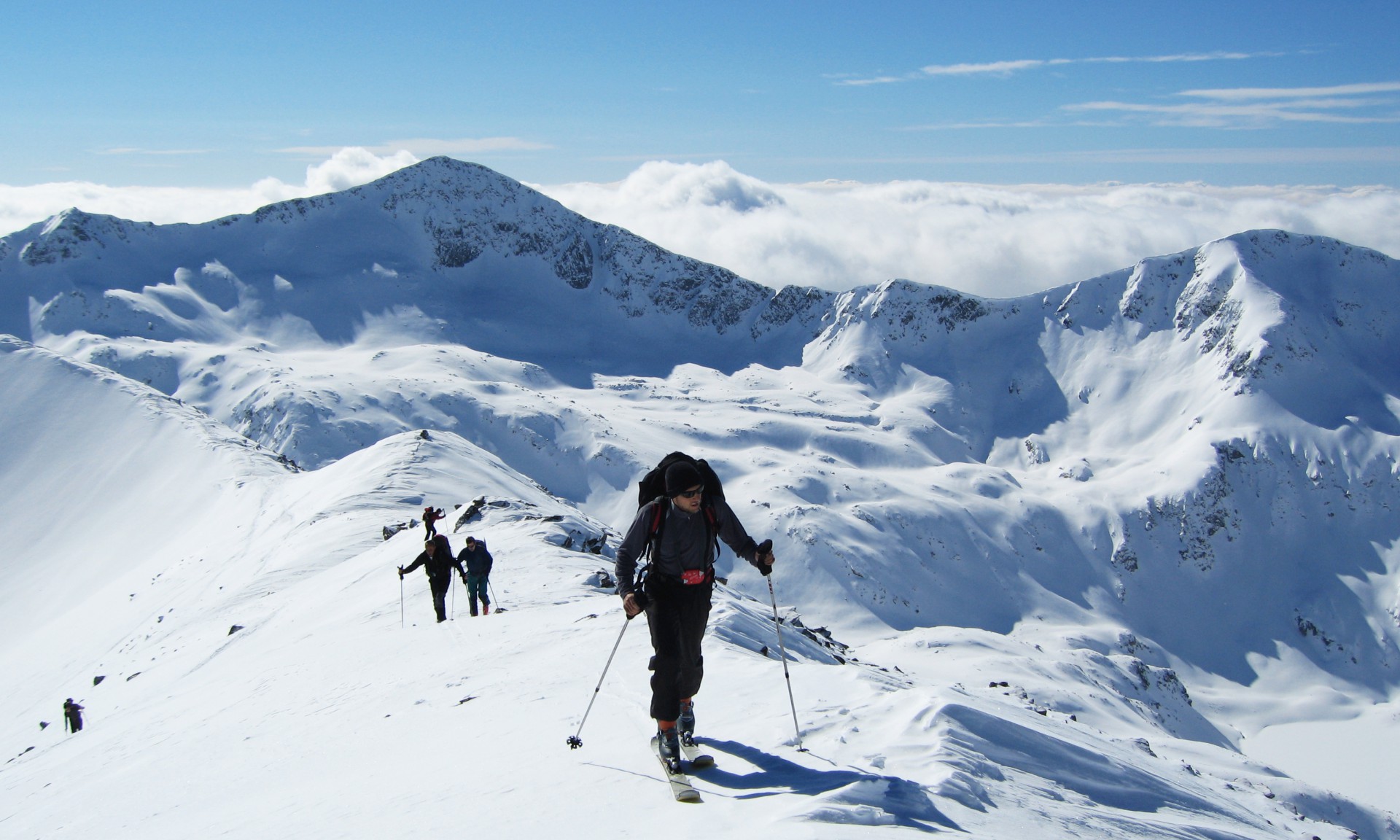
Source: Pathfinder Travels
I've got the feeling that while tourists increasingly come to Bulgaria for the summer to enjoy the beach, the ski slopes are only left to the locals in the winter.
And that's a shame!
Bulgaria and its very mountainous landscape (although about a third of the country is covered by forests) are home to great ski resorts that are way less expensive than the French Alps, to mention only this praised destination. Bansko is a great place to start with, I tell you a bit more about it further below.
15. Travel by car if you can, by bus if you can't
A lot of Bulgaria's cool places are off the beaten path. That's why it might be hard to access them if you don't have your own car since the transportation system is not really developed.
When you travel longer distances, consider the bus rather than the train. Both are cheap but by train, you can often double the transport time. Except if you're traveling from Sofia to Istanbul, then the train is a great option!
To visit Bulgaria the right way, I recommend car-sharing. If you own a car, you can offer transportation. If you don't, you can ask if people have seats available. This Facebook group is a great place to do that.
You need to know these 5 tips if you're driving in Bulgaria
16. Drive in the left lane whenever you can
I came from France with my car (that was one hell of a road trip for a small Opel Corsa!). If you also come to Bulgaria by car or rent one when you're there, it won't take long before you notice that the part of the lane that's on the far right is usually more damaged than the rest. If you ask me, everything that's far right is usually more damaged than the rest, but that's another story...
Be careful though:
I'm not advising you to drive against traffic! I'm talking about roads that have several lanes, like the highway for instance (but many streets within the cities do have several lanes as well).
If you don't want to regularly have to change your tires and car's suspension, drive in the left lane.
17. Enjoy the great customer service at the gas stations
You may have understood from my comment on how they bring your meal at the restaurant that I don't expect a lot from customer service in Bulgaria. The fact that my local friends told me themselves that it was bad doesn't help me change my mind either.
But when it comes to the gas station, it's a whole other level!
I can't help but compare to France, where I've spent most of my life. There, I put the gas myself, check for the pressure of my tires like a big boy, wash the bugs off my windshield alone.
In Bulgaria, there is someone to do it all for you! You just have to park and pay.
Even better? Read this:
When I was going to Sinemorets at the seaside (yes, that's one of the places you should go to instead of Sunny Beach), I stopped at a gas station on the highway to refill. The guy told me that one of my lights didn't work. He said that if I bought a new one at the station, he could change it right away. How great is that?!
By the way, the price for gas is between 2,03 and 2,18 BGN per liter dependant on what you need.
18. In Sofia, find a free spot to park... and leave your car there
I hate driving in Sofia. It's a nightmare.
I'm not talking only about the way people drive, although that's worth mentioning. I'm talking about the traffic lights EVERYWHERE. There are no roundabouts in Sofia, or when there is, they also put lights inside of them!
The city was built to accommodate about one tenth of the current amount of cars. One tenth! In a word: expect traffic jams. A lot of those.
Another thing that will make you hate driving in Sofia is that all the parking spots are paid. They belong to either green or blue zones, which only differ in the amount of time you can stay in one spot.
However, if you're planning on staying for a while and getting your own accommodation, that's another story:
You can ask for a sticker to add to your windshield that will allow you to park in the zone close to your place. But it's only one per address, so don't count on it if you're sharing a flat and the other person already has one.
I was lucky enough to meet a guy who knows a free parking (the only one?) in Sofia. Ask the locals! Or leave your car out of the center.
19. No motorway fee, but you have to buy a sticker
The highway isn't free in Bulgaria, but the toll system is different. You buy a vignette sticker that "allows" you to drive there.
It might be tempting to drive without but it would be costly for you to get pulled over by a policeman and not have it.
It costs 15€ for a month. It's a bit costly but if you plan on using your car regularly, you'll have to buy it.
20. Drive with your lights on
It's raining? Lights on. It's dark? Lights on.
It's sunny? Also lights on. You might get pulled over if you don't drive with the lights on, so make sure you don't forget them.
You don't want to miss on Bulgarian cuisine: try these 11 dishes
I'll be honest:
It's sometimes hard to differentiate Bulgarian dishes from those of the neighboring countries and the Balkans in general. But don't say that to a local, especially when you're talking about yogurt!
One thing is for sure: it's delicious.
What's more?
It doesn't matter if you're vegetarian or carnivore: the cuisine of Bulgaria can easily please everyone.
21. Lutenitsa, or what makes my taste buds dance
I recently told that if Bulgaria started exporting lutenitsa (лютеница), the world would be a better place. This slightly spicy mix of tomatoes, peppers and more is so delicious that it might put an end to wars.
But here's what you MUST do:
Visit a village where they sell homemade lutenitsa. There is nothing like it, and that's the only one I would recommend. You can find some in supermarkets, but it doesn't come anywhere close to the homemade one.
Let me explain how to it lutenitsa like a local:
Take a slice of good bread, spread a layer of lutenitsa on it and add pieces of white cheese on top. That's all. When I start, I just can't stop until I've run out of one of the ingredients.
Now, you can actually eat it with pretty much everything: Bulgarians love to eat it with their meat for instance. And they do have some great meat.
22. Kyufte and kebapche, for meat lovers
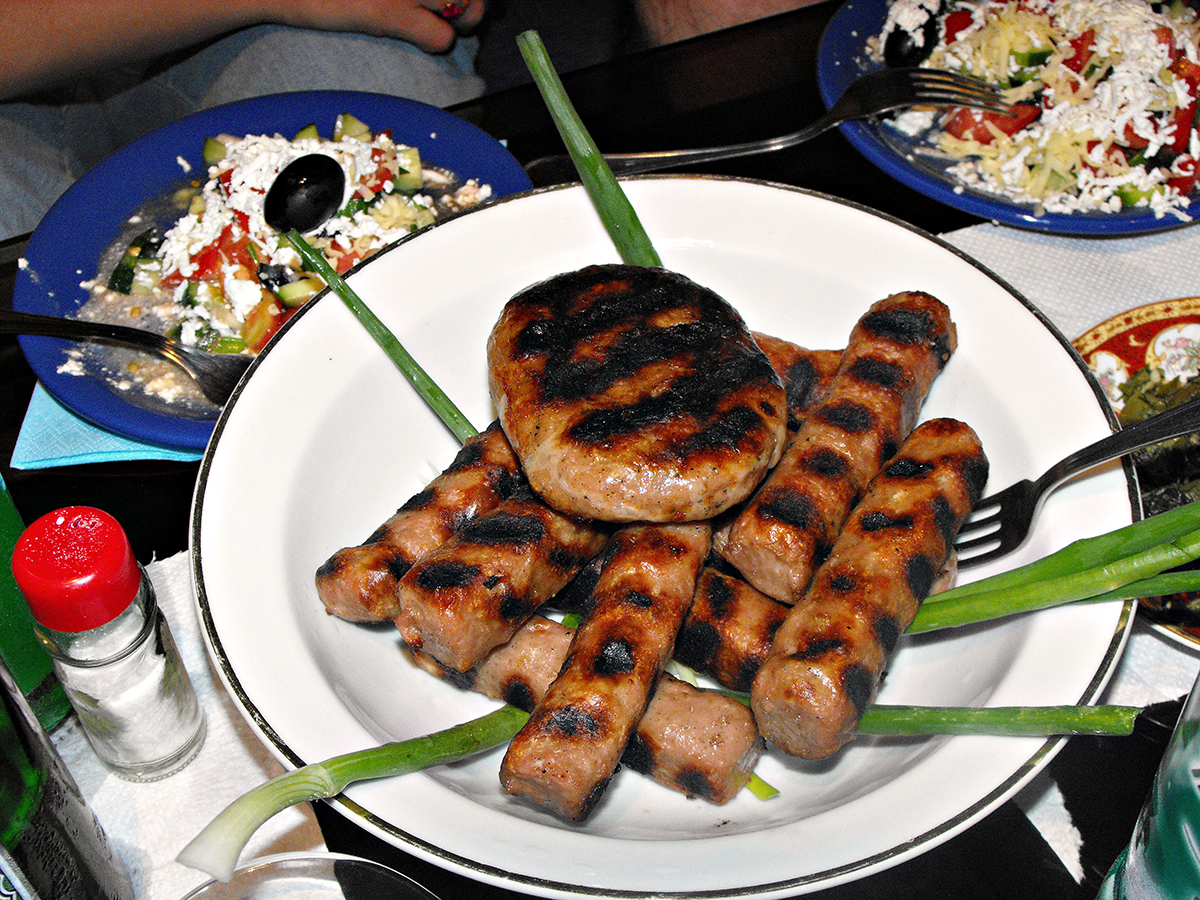
Source: Kashkaval Tourist
Nothing is as symbolic of Bulgaria's cuisine as kyufte (кюфте) and kebapche (кебапче) I think.
There probably isn't a single traditional restaurant that doesn't have the delicious meatballs and sausages made of minced pork meat on its menu.
Tip to pose as a local: it's very typical to eat it with French Fries and cabbage salad.
That's not enough meat for you? Wait for it...
23. Meshana Skara, a bite of heaven for carnivores
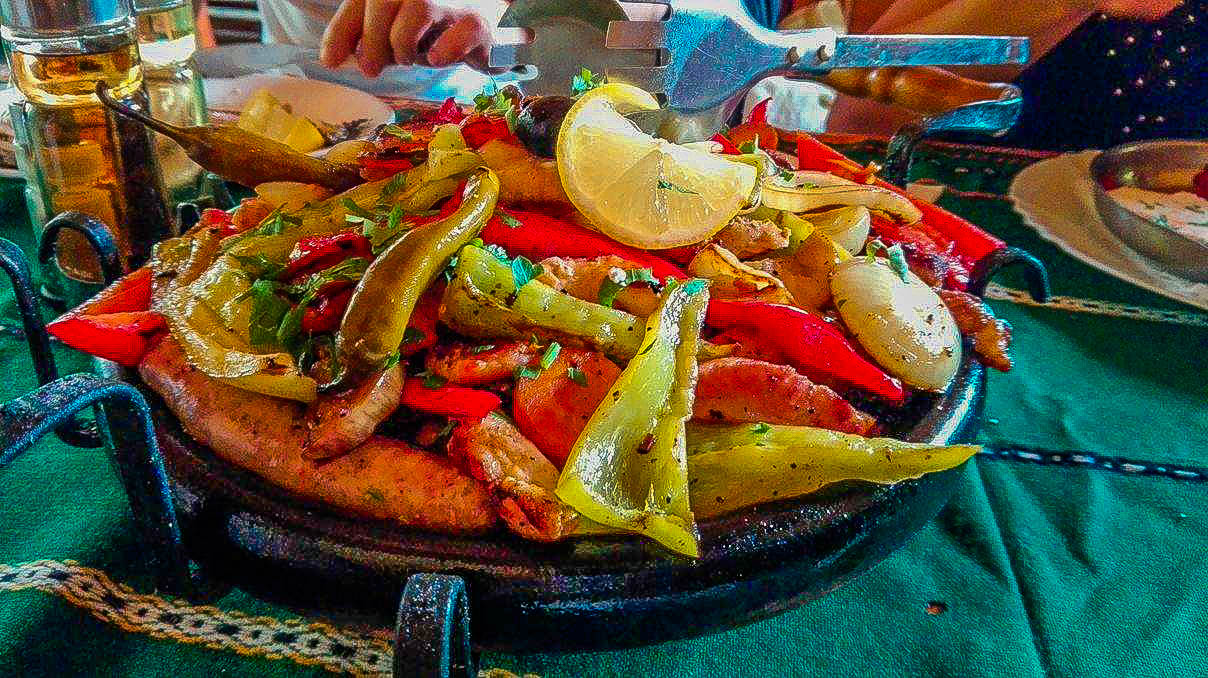
(Trust me, the meat was under all the vegetables)
The mixed grill plate (мешана скара) is an assortment of meat, served all at once: kyufte and kebapche are obviously part of the deal.
But it's also your chance to try nadenitsa (another kind of sausage with different spices), karnache (another one) and shishche (meat skewer)!
Friendly advice: eat it for lunch rather than dinner. It's delicious but sits heavily on the stomach.
24. Skip McDonald's and international brands, go for the local pizza
That's a tip which isn't specific to Bulgaria if you ask me. And I know how tempting it is when you don't want to cook yourself. You're right.
However, if you're into fast food, do it the Bulgarian way when you're in Sofia, the capital city!
Everywhere you go and even more so as you get closer to the city center, you will see that you can buy slices of pizza in the street. And if you think that a slice isn't enough, think again: it's super filling (and tasty).
Free tip: Head to my favorite one: it's at the end of Vitosha Boulevard, before reaching the National Palace of Culture (more on these place later).
Here's the best part: it costs exactly 2,50 BGN. That's about 1,25€. I'm not saying it's healthy, but it IS cheap. Plus, plenty of them are vegetarian!
25. French fries with cheese, the delicious crime
As a Frenchman, I consider it a crime to put white cheese on fries. Just as much as putting a sausage in a croissant.
That said, Bulgarians LOVE that. If you want to blend in, do try it out.
They eat it everywhere as well, but I saw that it's a best-seller at the seaside, along with the traditional salad.
26. Shopska Salata, healthy and fresh
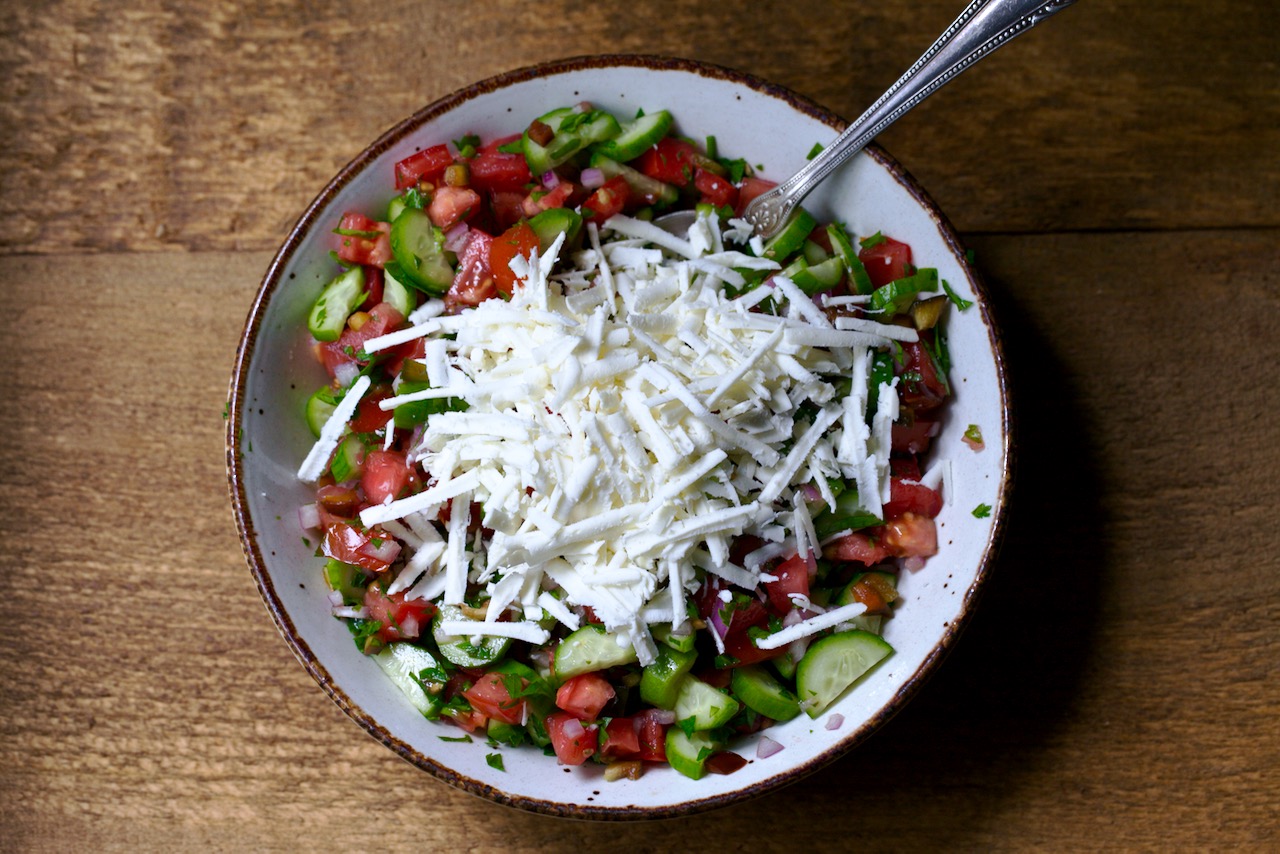
Source: Craving Greens
The iconic salad couldn't be any simpler: tomatoes, cucumbers, and white cheese (plus a few onions sometimes). I'm not a big fan of cucumbers myself but I can't deny the refreshing power of the shopska salata (шопска салата) in the summer.
Let me be clear:
You cannot say your trip to Bulgaria was complete without trying this dish.
27. Who cares where it comes from, it's tasty!
Don't even start arguing with a Bulgarian about the origins of some dishes: mish mash (миш маш, close to the Turkish "menemen"), musaka (мусака, close to the Greek "moussaka"), pulneni chushki (пълнени чушки, stuffed peppers) or sarmi (cabbage leaf rolled over rice or minced meat) are only a few example of delicious food with arguable origins.
Who cares? It's good, just eat it.
28. Try the soups, even if you can't grow anymore
That was my mom and grandmother's argument to make me eat soup as a child: it will make me taller.
If that's true and if I had known Bulgarian soups sooner, I'd be at least 1m90 today.
A local favorite for the summer? Tarator (таратор). Think of it as a liquid tzatziki. It's a cold soup essentially made of yogurt, water, minced cucumber, and garlic.
If you're not really into cold soups, you might want to try Shkembe chorba (шкембе чорба).
Two things about this traditional tripe soup:
- It's disgusting. Seriously. Bulgarians either love it or hate it. I've picked my side.
- It has a reputation for being the best hangover cure. I still believe you're better off with a hangover.
I tried it for the first (and last) time after hiking Vitosha Mountain. I'd do the hike again in flip-flops in the winter rather than eat it again.
Here's what I love and recommend instead:
The bob chorba (боб чорба) a hot bean soup. That's a safe and tasty bet.
29. Lactose intolerant folks, run
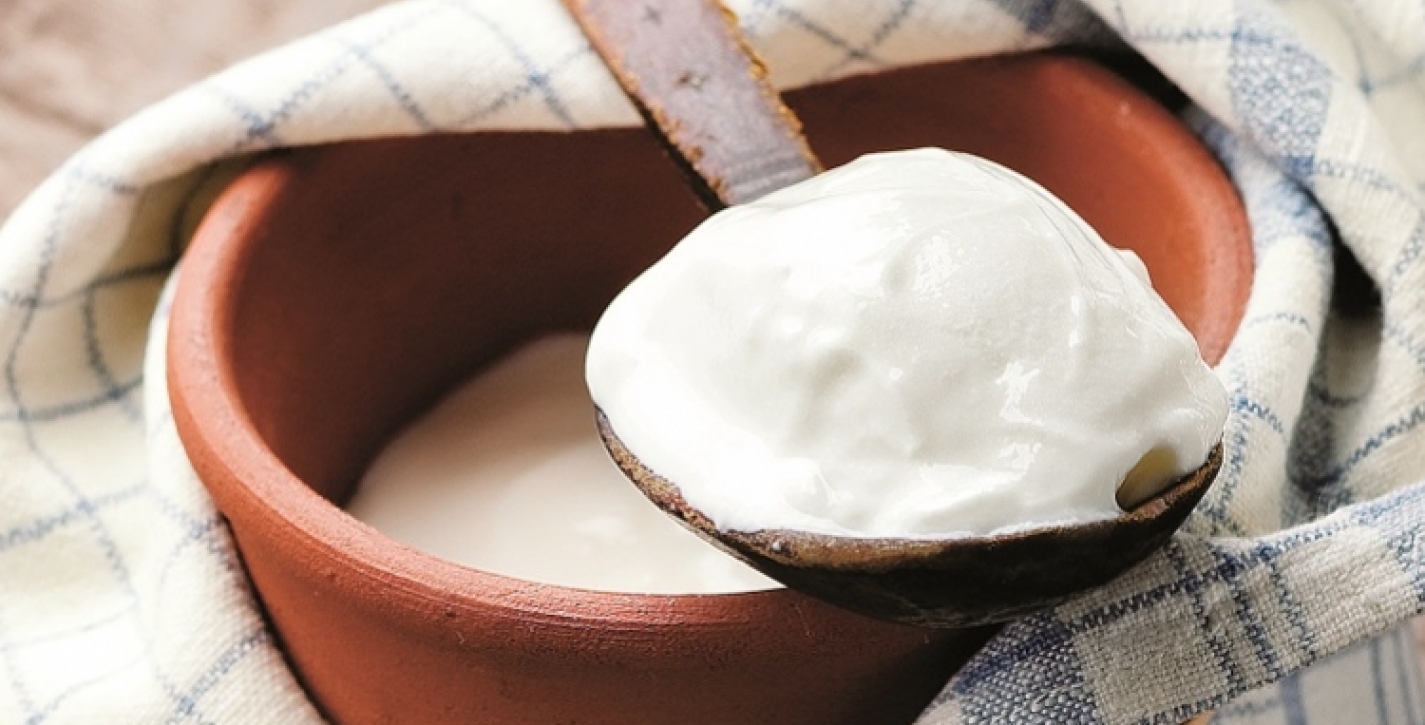
Source: Tasting Europe
If you don't have a stomach for dairy products, you probably won't enjoy Bulgarian food as much. People here do tend to add white cheese (сирене, pronounced "sirene") everywhere.
The alternative is yellow cheese (кашкавал, pronounced "kashkaval").
Here's how to prepare a perfect breakfast combining both yellow and white cheese:
Mix eggs and white cheese together, apply the mixture on a slice of bread and add pieces of yellow cheese on top. Put it in the oven about 15 minutes. Enjoy your breakfast. It doesn't take more than 20 minutes in total!
You'll also notice that Bulgarians eat a lot of yogurts and add some in many dishes as well, so again, I hope you can manage dairy products!
30. Banitsa, my alternative to croissants
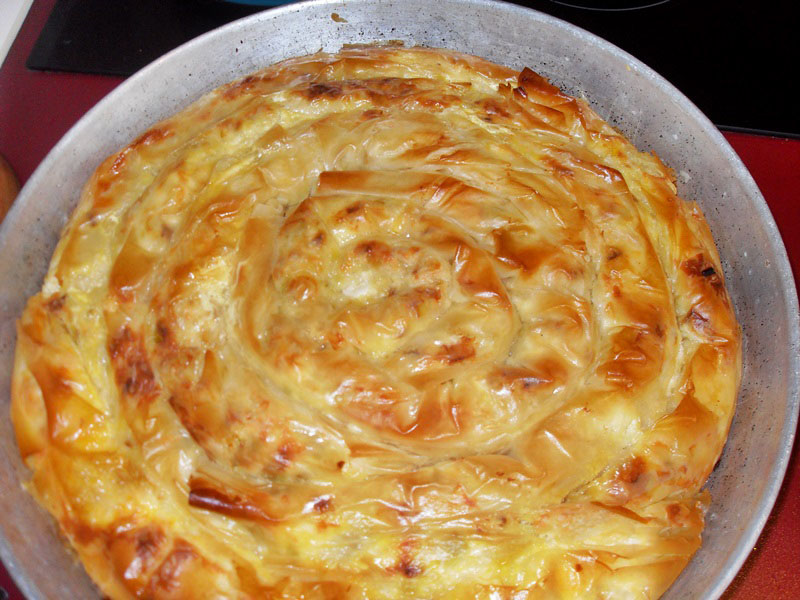
Source: Maria from Travelling Buzz, with a great recipe!
This sort of pastry filled with cheese is perfect for breakfast and I can only strongly recommend you to try it out.
It's so much better than the (fake) croissants that you can also find everywhere. If you want croissants, go to France. In Bulgaria, enjoy the delicious banitsa (баница).
31. Yes, drinks are good and cheap
From experience, I know that people often associate Bulgaria with two ideas: it's cheap and people drink a lot.
While it saddens me a little bit, I can't deny the truth of it: the country is generally cheap for Europe and people like to drink. But what do they drink?
The most typical alcohol you will find here is rakia (ракия): this strong drink can be made of plums, grapes, quince, figs and so much more. Homemade ones can contain as much as 90% of alcohol, but it usually averages 40%.
Obviously, many liters of beer are drunk every day in Bulgaria, as in the rest of the world. But of all alcoholic drinks, I found that it's the wine that deserves most praises.
I visited a distillery close to Melnik where I tried several sorts of wine recommended by a friend from Sofia. Let's be honest: I may be French, but I couldn't tell you much about wine. What I can guarantee is that Bulgaria has some more than decent bottles!
"So they do drink only alcohol!", I hear you think. No, they don't. One of the locals' favorite drinks is ayran. Made of cold yogurt and salt, it's a perfect refresher.
There is a lot more about Bulgarian cuisine, but you'll find out yourself!
Now, I'm going to give you some of the cities that are definitely worth visiting in Bulgaria. And no, it's not all about the seaside.
Don't miss on these 9 cities
I've made Sofia my base since I live in Bulgaria, but I have visited my fair share of cities and villages. Here are the ones I think you should really know about.
32. Sofia, the capital city
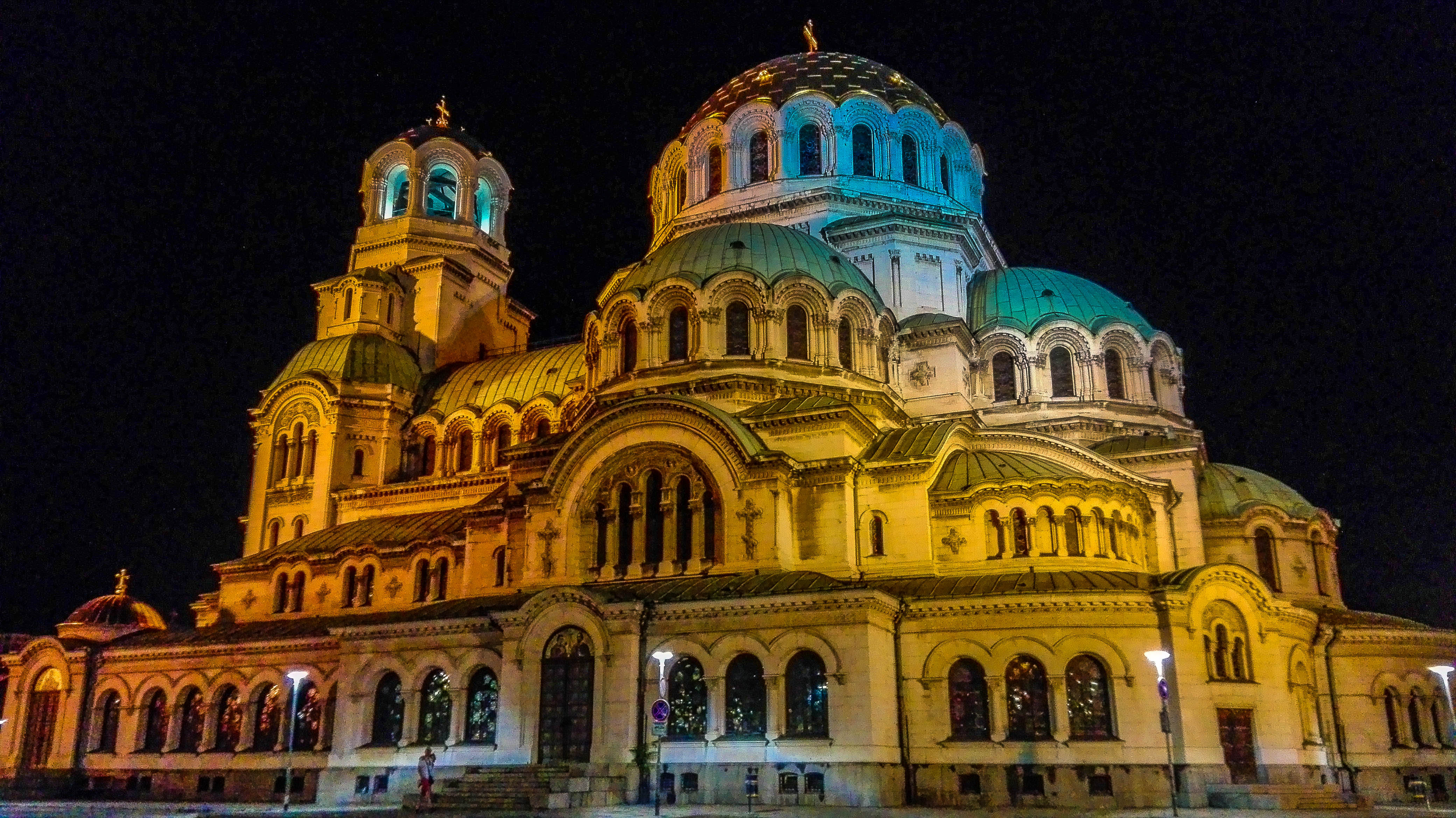
Let's get the obvious out of the way. The capital city is a must-visit, especially if you're a history buff. The city center alone is home to the Alexander Nevski Cathedral, ancient remains of the Serdica fort and the statue of Sveta Sofia (which translate as "holy wisdom").
I love the cultural mix of the city: close to Sveta Nedelya Square can be found an Orthodox church, a Catholic one, a Jewish synagogue, and an Islamic mosque. I wouldn't qualify the country as the most tolerant one but it has undoubtedly a very rich past.
Here's what you should do when you get there: go on the Free Sofia Tour. A guide walks you through the main points of interest in about 2 hours. As the name suggests, it's free, but the guides are really great and the organization definitely deserve a donation at the end of the tour.
That said, here's how to live like a local in Sofia:
In the evening, grab a beer or a cider (I didn't mention that, but they're just as popular) and go sit in one of the many parks with your friends. There are benches everywhere! My favorite park is the one in front of the National Theatre.
Head to Vitosha Boulevard: at the end of the pedestrian street packed with bars and restaurants, you'll be able to see Vitosha Mountain. Yes, you can see the mountain from the city center. How amazing is that?!
But before reaching the mountain, you'll get to the National Palace of Culture which the locals call "NDK". As I mentioned before, don't forget to grab your slice of pizza before chilling in the park.
I have so many places to eat to recommend you that I don't know where to start. For Middle-Easter food, check out Ashurbanipal. It doesn't look like much, but the owner is an amazing cook that will make you feel like you're family. For Italian cuisine, go to Bistro Pesto: no pizzas, but amazing pasta and sandwiches. Something more typical? Book a table at Rakia Raketa. Seriously, book before, it's always packed (for a reason).
To get around, you have different options: one of the two subway lines (a third one is in the making), many buses and trams or a taxi. While I usually hate spending money on transportation, taxis in Sofia are super cheap. Just be careful not to get ripped off and ask the driver to start the meter. I recommend that you use only Yellow Taxi if you can. But if you're not in a rush, just walk: Sofia isn't that big.
Here's something you should do if you want to escape the city for a day: head to Pancharevo Lake, 20 minutes away, rent a kayak (10 BGN per person, so 5€) and enjoy the sight.
But here's the kicker:
In the winter, when temperatures are (very) low, Sofia isn't quite as enjoyable. At least according to the local themselves, I haven't been here during the winter yet.
33. Plovdiv and the city's (almost) seven hills
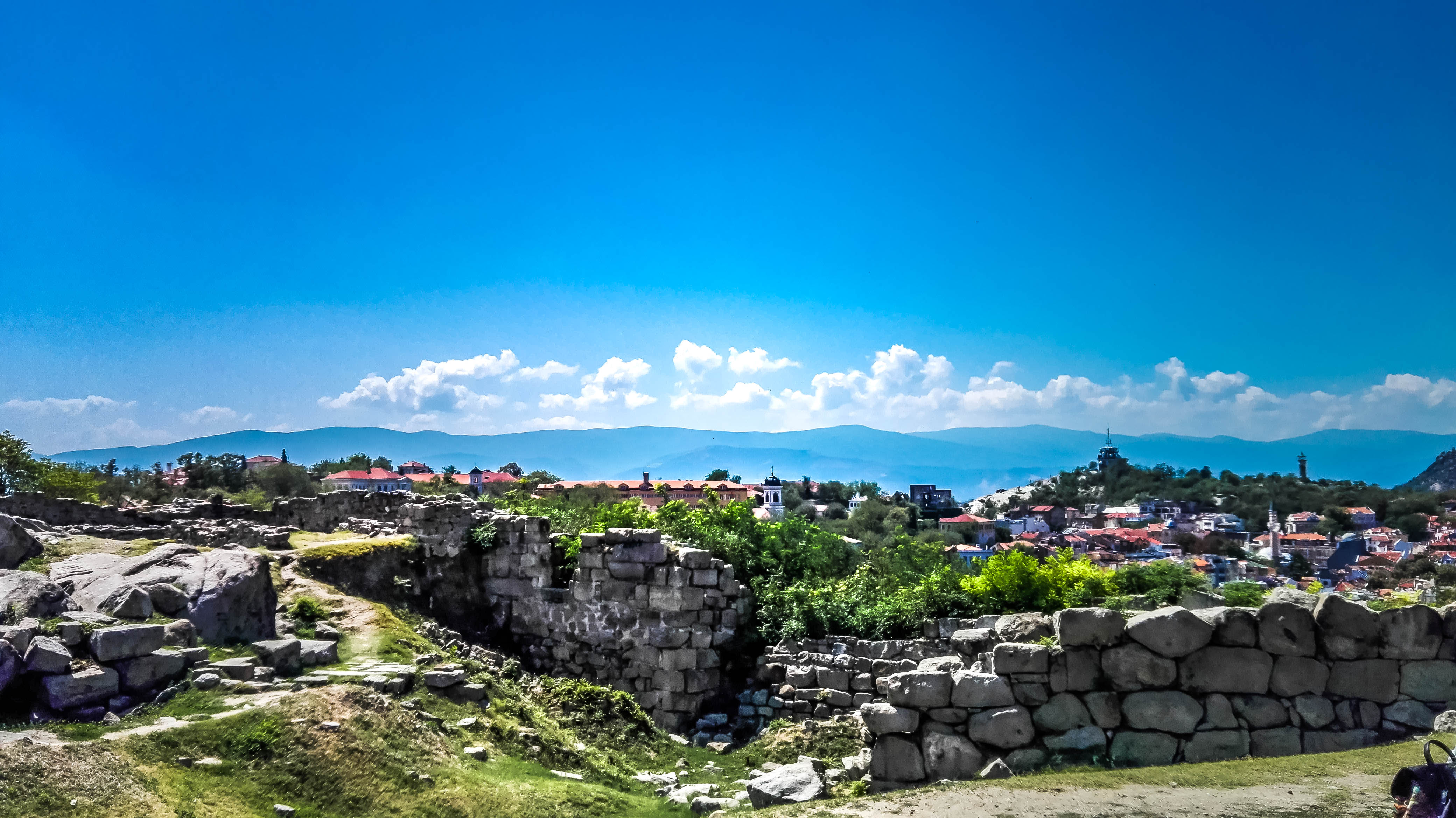
I bet you didn't know this:
Plovdiv is the oldest European city to be continuously inhabited. It was founded roughly 6,000 years ago and has never been deserted.
The reason why I said that the second largest city of Bulgaria has almost seven hills is that one of them (Markovo Tepe) was destroyed. Now, they're building a building where it used to stand. Such a shame...
But Plovdiv truly is a beautiful and historically rich city, home to Soviet buildings, Thracian fortresses, Roman amphitheaters and Byzantine arches. The historic center alone is worth the hour and a half drive from Sofia.
If you haven't come to Bulgaria for its past, rest assured that Plovdiv will still be up to your expectations. The nightlife is nothing short of vibrant and many bars and clubs will satisfy the partygoers.
34. Melnik, the smallest town in Bulgaria
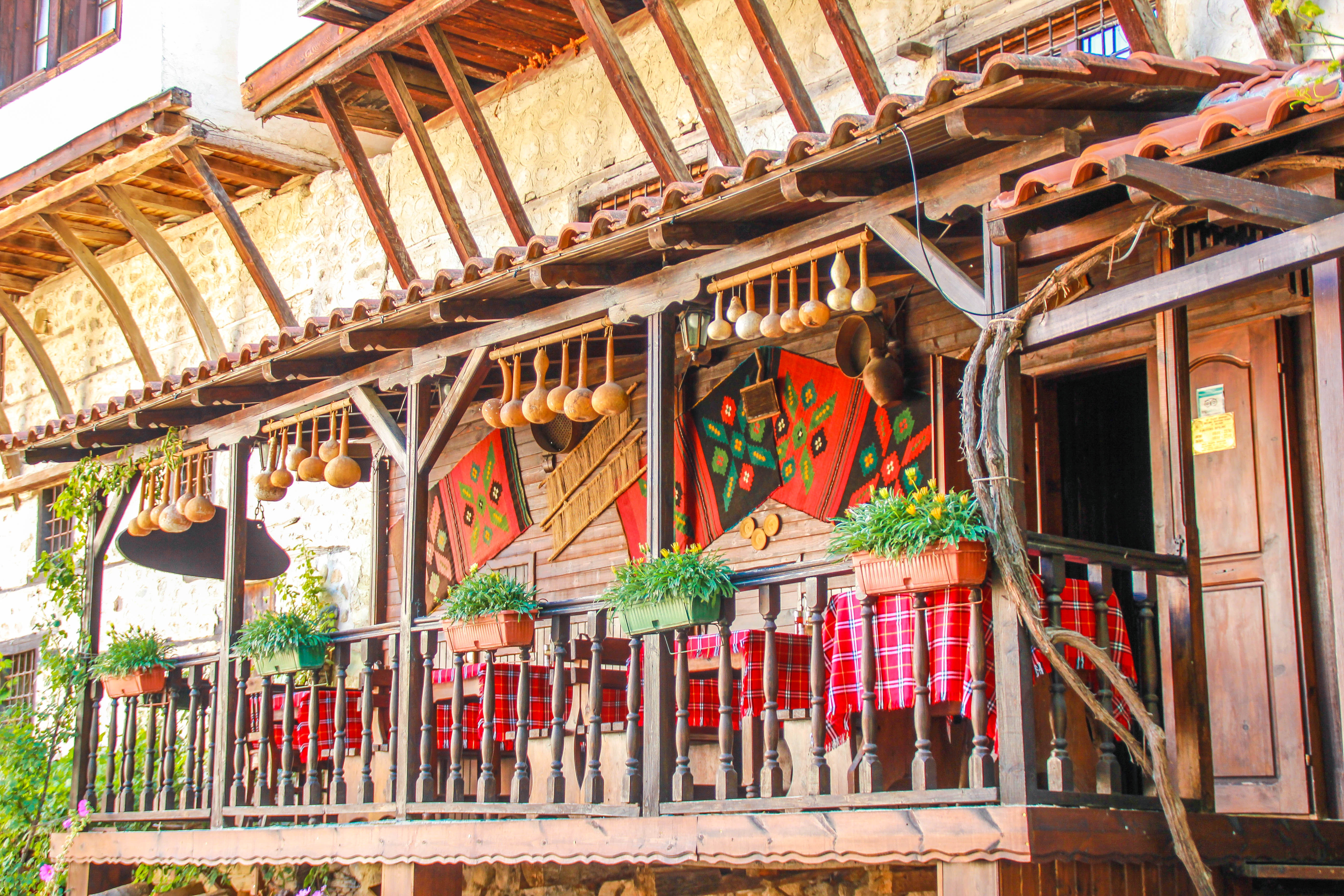
With less than 400 people, Melnik definitely isn't crowded. You should definitely go there and try the wine as I did. There are several refineries close by, but the town itself has many places to visit for wine tasting.
And this is crazy:
Winston Churchill's favorite wine came from Melnik, so they say!
Its title of smallest city in Bulgaria and the presence of the Rozhen Monastery make Melnik a popular destination worth a couple of days of visit at least. The Melnik Rock Pyramids are also a popular sight there.
35. Koprivshtitsa, the revivalist cradle
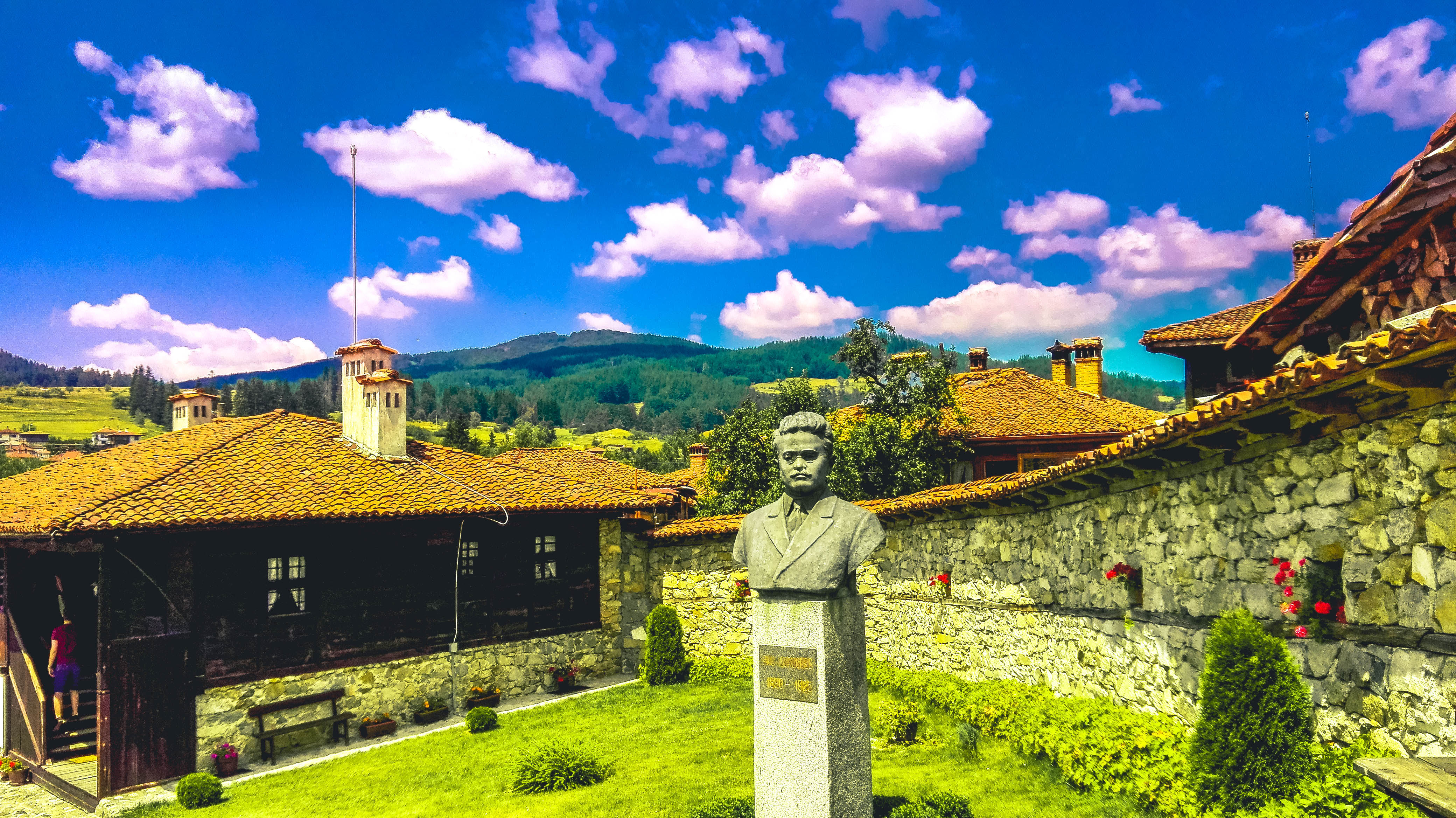
To keep in the line of small cities in Bulgaria, you want to swing by Koprivshtitsa (try to say that out loud...). The town is a symbol of the April Uprising and the beginning of the war that started in 1876 to fight off the Ottomans.
Full of memorials of artists and writers that personify the National Revivalist period, it's a very quiet town with colorful houses close to the Sredna Gora Mountains.
36. Bansko, for winter games
I said I haven't been in Bulgaria during the cold months - but I can't for winter to come (Game of Thrones pun intended) and visit Bansko. The winter sports resort is a favorite for Bulgarians avid for adrenaline rushes.
At the foot of the Pirin Mountains, the town is perfectly located for this purpose. It's also a perfect starting point for a hike there in spring!
Bansko also has its fair share of artisanal boutiques for you to bring back a souvenir of your stay. But what I loved the most there were the taverns: they have such an authentic feel, it's like going back in time for a while. The town is also full of high-standards hotels if that's more your thing.
37. Veliko Tarnovo, "City of the Tsars"
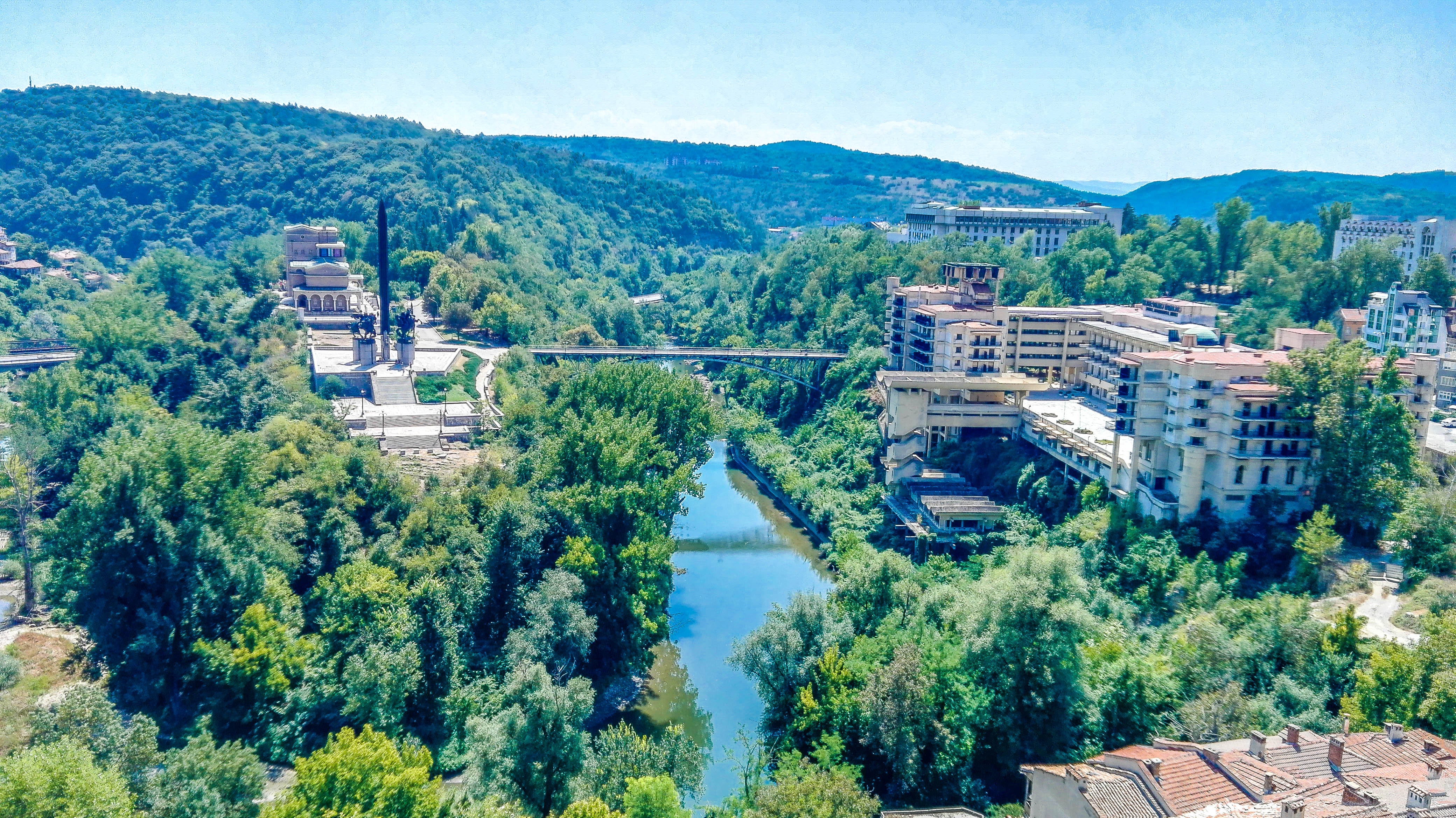
The city used to be Bulgaria's capital, back in the 12th century, under the Second Bulgarian Empire. I loved the main old street (Rakovski) where I ate at Shtastliveca, a great restaurant with an amazing view over the Yantra River.
You should also visit Tsaravets Fortress, the main attraction in town. There's even a light show sometimes! Just don't visit it when it's too hot. Veliko Tarnovo has the reputation of being the hottest city in Bulgaria, which I learned the hard way.
The Asen Monument in the middle of the city is also said to be a highlight of the city. It was erected as an homage to the leaders of the rebellion against the Byzantines. To be brutally honest, I didn't find it really beautiful and don't think it's worth a close look: seeing it from Rakovski street is way enough.
But what I loved most about Veliko Tarnovo is out of the city:
20 minutes away are two waterfalls: Kaya Bunar is beautiful and accessible directly by car. That means that it can easily get crowded. If you go there, take the path that will bring you to the top: you can swim there and it's less busy. The second waterfall is Momin Skok. It's the culminating point of the Negovanska ecotrail which starts in the Emen village. It's a really beautiful place and the hike is very easy and rather short (about 2 hours).
38. Belogradchik and its rocks
All of my friends here in Bulgaria told me that the north-west is boring. But I beg to differ: if only for Belogradchik, it's worth checking out.
Close to the Serbian border, it's true that the city itself doesn't have a lot to offer. But the Belogradchik Rocks are a Natural Landmark of Bulgaria. The weirdly shaped rocks are the inspiration of many legends. The fortress is also a highlight that reminds the one of Veliko Tarnovo.
The Magura Cave nearby is another touristic attraction where one can admire mural paintings dating back to prehistoric times. It's worth checking out, right?
39. Sozopol
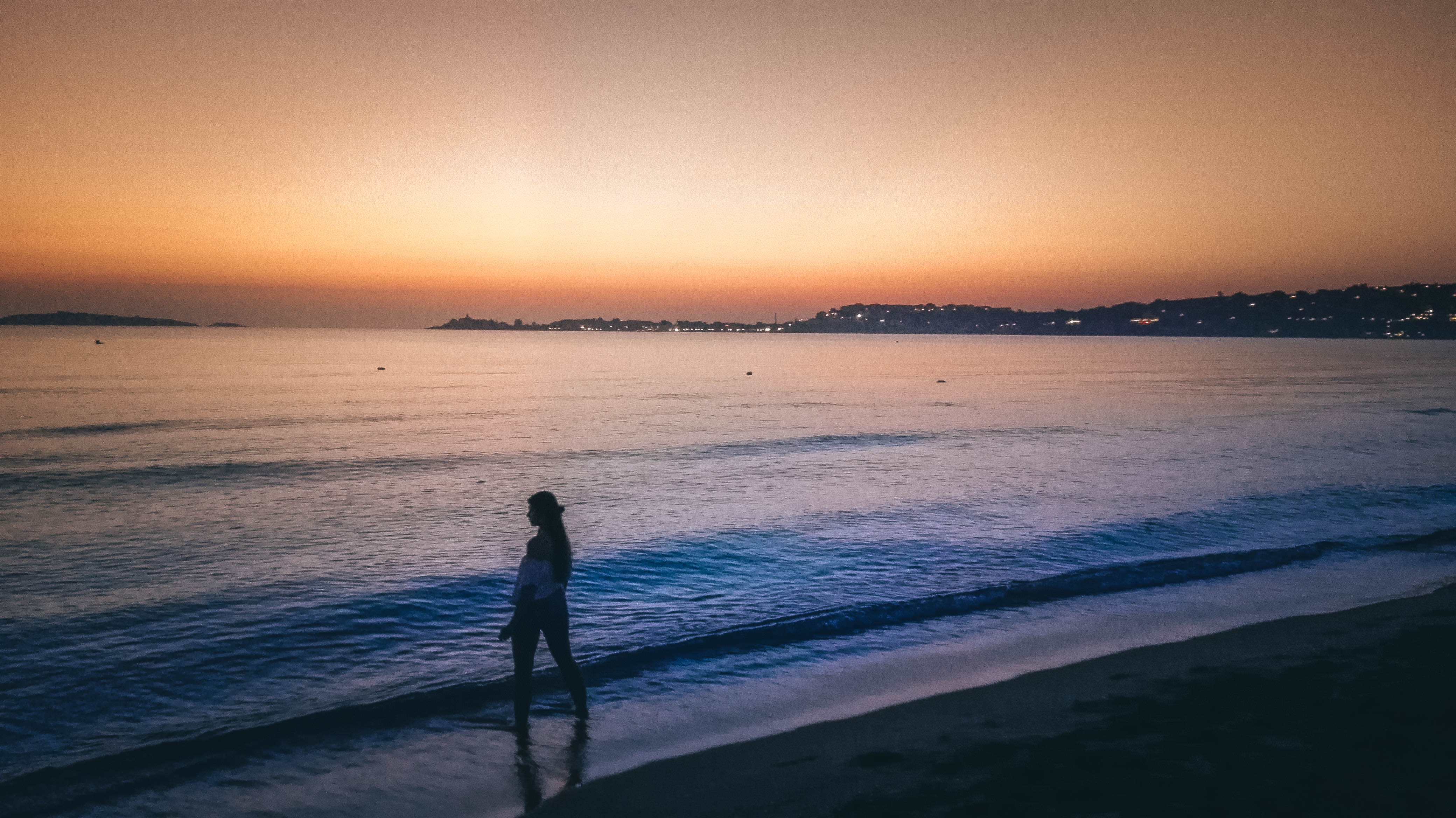
We're finally getting to the seaside! Bulgaria does have a wide range of places to visit for beach lovers. Sozopol was my first experience with the Black Sea and I loved it.
Now let's get things straight:
I'm talking about the old town. The "new" Sozopol doesn't have anything special. But the paved streets of the old town are perfect, although busy in the summer. It's a great place to enjoy seafood, and yet my favorite place there is Работилница на веселите палачинки. They serve both salty and sweet pancakes (crepes, actually) with homemade jams. Amazing.
Also, if you're looking for a place to stay, I can recommend Just a Hostel. The staff is super friendly and the breakfast great. It's perfectly located in the middle of the old town.
40. Burgas
There is a barely implicit rivalry between Burgas and Varna, Bulgaria's 3rd largest city. I found the latter slightly richer and snob: that's why I prefer Burgas. Although it's by the Black Sea as well, there are plenty of other points of interest there.
Check out the Pier but also the lighthouse. Take also a look at the Clock and the Compass, symbols of the city. When you go out of the city, have a wander around the Burgas Lakes that surround the city.
If you'd rather walk around in the city itself, head to the sea gardens and stop by the Fairy Tales wall: it's a representation of popular fairy tales and an atypical sight.
I'm stopping here for the cities to visit in Bulgaria but do keep in mind that there are many others worth a detour!
Here's a quick list of these:
- Varna (3rd largest city with multiple cultural influences and lively nightlife)
- Nessebar (UNESCO World Heritage at the seaside)
- Troyan (for its favorable climate said to help cure pulmonary diseases)
- Pleven (apparently the cleanest town of Bulgaria)
- Velingrad (no less than 70 sources of mineral water)
- Starosel (for its Thracian cult complex)
- Sliven (for its Roman tombs - plus, the city is divided by 3 rivers)
- Ruse (known as the “Little Vienna” and town of firsts: the first printed Bulgarian paper, the first completed railway road, the first navy school and weather services)
- Obzor ("the city of the sun")
- Cape Kaliakra (legends tell of treasures hidden in the caves)
That should be enough to keep you busy. If not, keep reading.
Only go to these 10 places if you want a real taste of Bulgaria
Cities are great. But I found myself enjoying, even more, the places out of them. Bulgaria has such a varied panel of landscapes: rivers, mountains, sea, ecotrails, caves, and more. And they thought it was all about cheap drinks and the seaside...
Leave Buzludzha to others
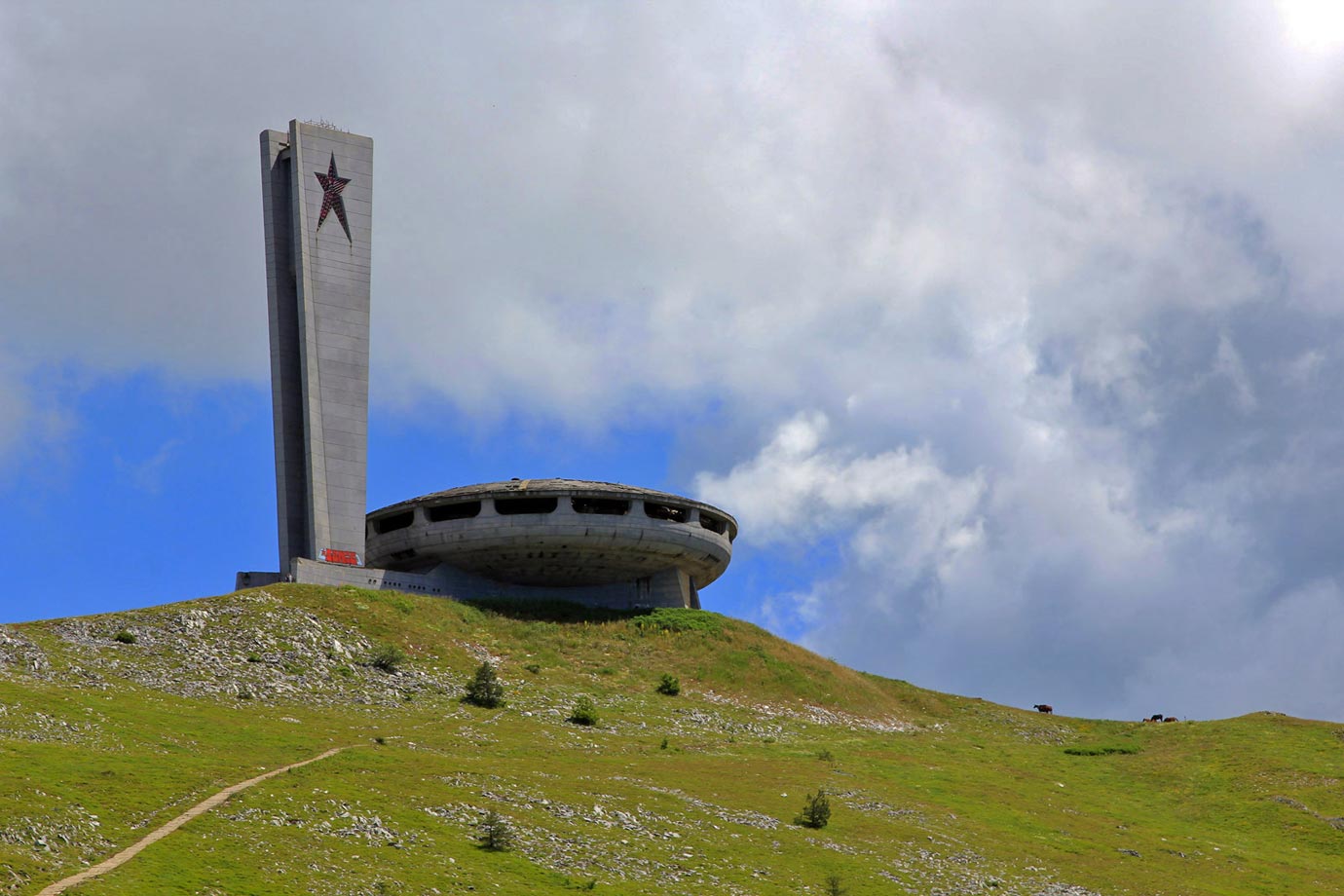
Source: A Brit & a Broad
I haven't seen the UFO-shaped structure vestige of Bulgarian communism with my own eyes and I don't think you should either. It's been closed to the public and I doubt the 80 km from Veliko Tarnovo are worth the trouble.
Instead, I'd recommend you to look at this post from Macca Sherifi: he was there a few years ago and provides a detailed account of what he saw along with superb pictures (that includes a life-endangering selfie that he himself recommends to no one!).
41. For an easy hike, head to Vitosha Mountain
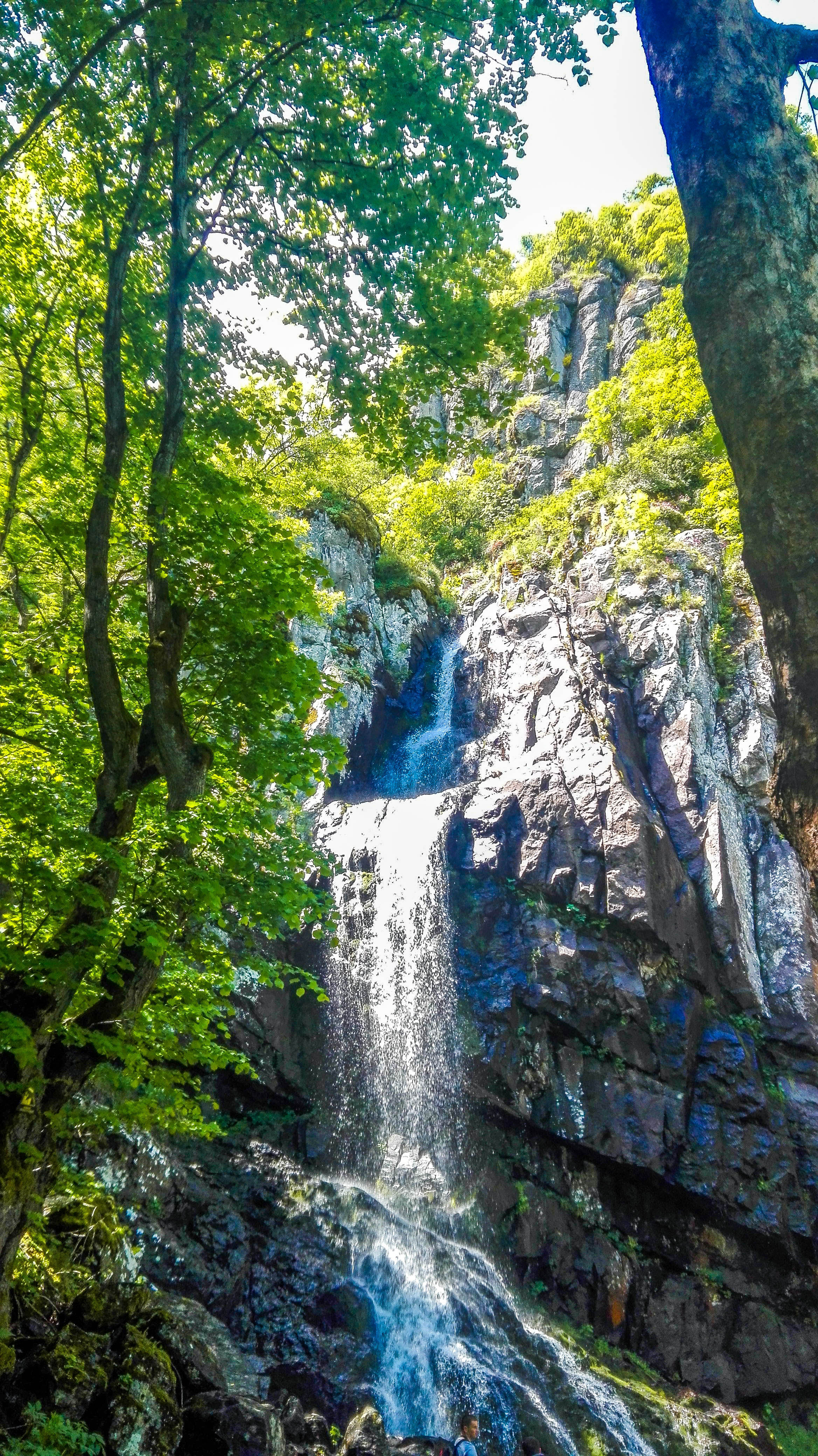
For starters, it's easily accessible from Sofia. There's even a bus that drops you off at the feet of the mountain. You can do the whole hike on foot or take the cable car. The highest peak (Cherni Vrah, or Black Peak) culminates at 2290 meters.
Make sure you stop by Boyana waterfall, it's a really nice spot where you're protected from the sun by the trees. During the climb down, be careful if it has been raining recently, it can easily get slippy. Although the hike is easy, be sure to take a pair of hiking shoes. I didn't the first time and regretted it.
And remember, when you reach the top and eat at the hut, try anything but the shkembe chorba!
42. If you're a seasoned hiker, you'll be more interested in Pirin National Park
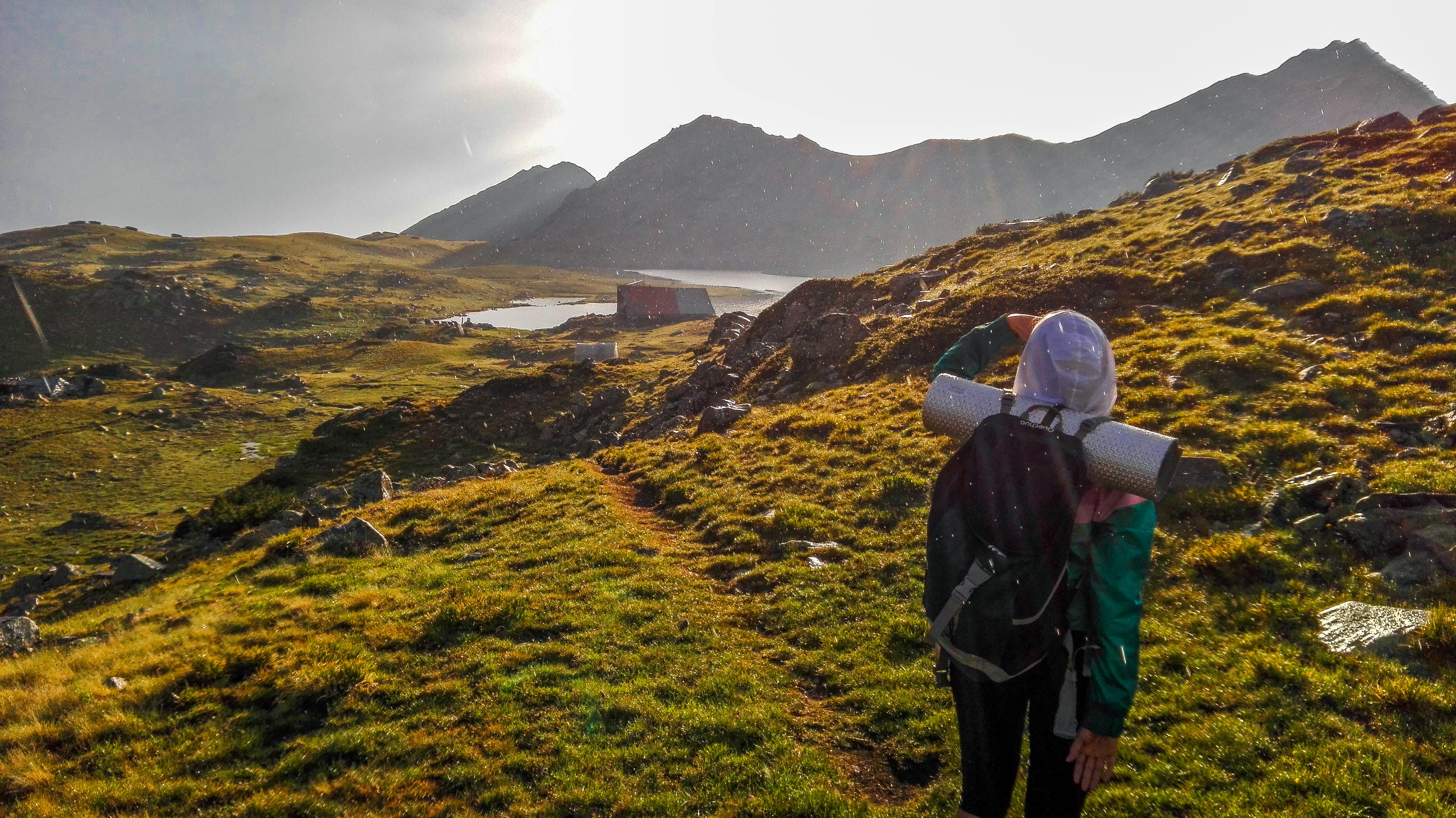
It's home to Bulgaria's highest peak, Vihren, culminating at 2,914 meters.
You need more? How about 186 lakes? That's how many you can find there.
Although I spent one of the worst days of my travel adventures there, I still believe that Pirin is the most beautiful place for mountain lovers. Just be warned: some of the hikes require a good physical condition. The huts are far from one another, so be sure to be prepared!
43. The 7 Rila Lakes: to do or not to do?
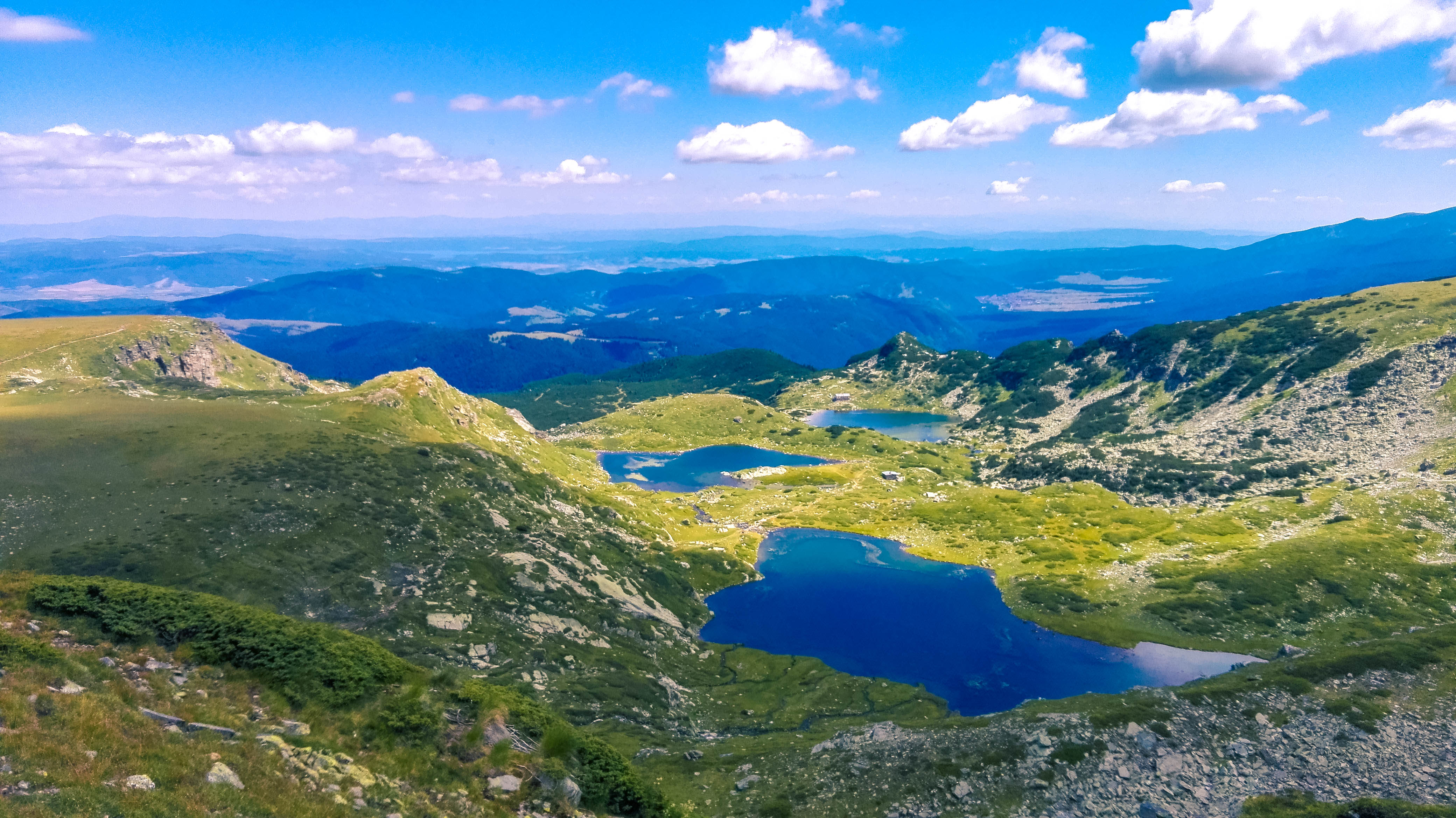
It's arguably the most mainstream and touristic place in Bulgaria. It also gives visitors a feast for the eyes.
What's the problem there?
It has become very touristic. There are A LOT of people hiking there. The construction of a cable car didn't make things better. But the worst is the big SUVs that bring tourists directly halfway through the hike. Please don't be this kind of people.
Yet, I still think you should go. The hike leads you along 7 lakes, formed by the tears of a female giant. So the legend says. They are named Tear, Eye, Kidney, Twin, Trefoil, Fish Lake, and Lower Lake. Once you reach the top, you get a view over all of them.
And it's beautiful.
44. Meditate in Rila Monastery
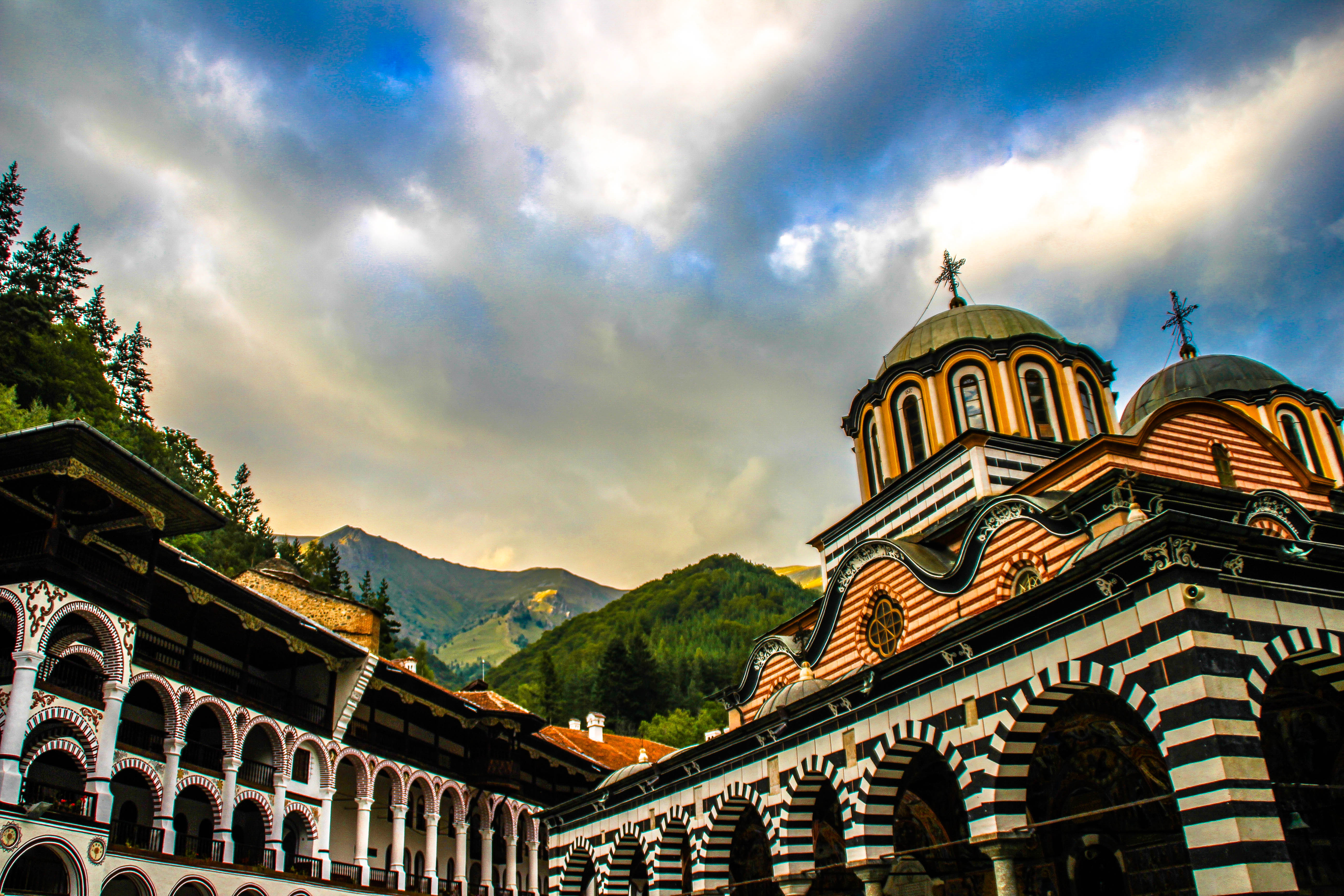
Of the largest Orthodox monasteries in Eastern Europe is also extremely popular. It is said to have been founded by Saint Ivan of Rilski during the 10th century. Saint Ivan actually lived in a cave nearby as a hermit in a quest for spiritual excellence.
Located in the Rila Mountains, you will drive for some time and think you're lost before actually getting to the UNESCO World Heritage and admiring the architecture of the building.
You should consider staying the night there: the Spartan accommodation is far from luxurious but it's an experience that you're sure to remember.
45. Dare to cross Devil's Bridge
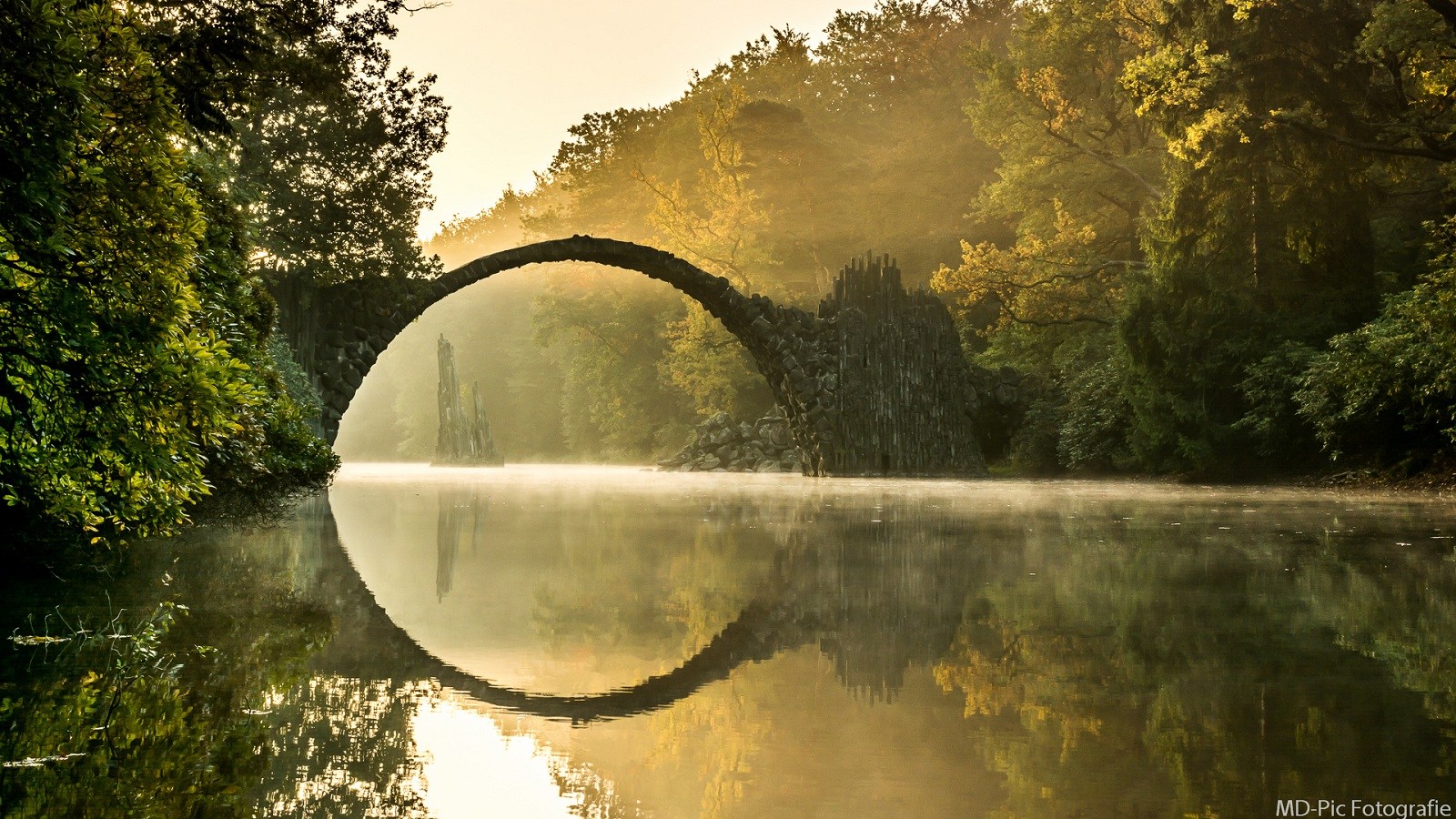
Source: Unusual Places
One way to cross the Arda River is to walk the Devil's Bridge, close to the city of Ardino.
I've read two legends about this place (I like the second one better):
The first one says that the Devil's footprint can be found somewhere on the rocks that pave the bridge. Hence the name.
The second one is a bit scarier. The wife of the man who built the bridge tragically died during the construction. Ever since then, her shadow haunts the stones, forever imprisoned. Be sure not to step on it when you walk by!
More than a place for legends, the bridge's architecture offers a very scenic view for photographers.
46. If not the bridge, how about the cave?
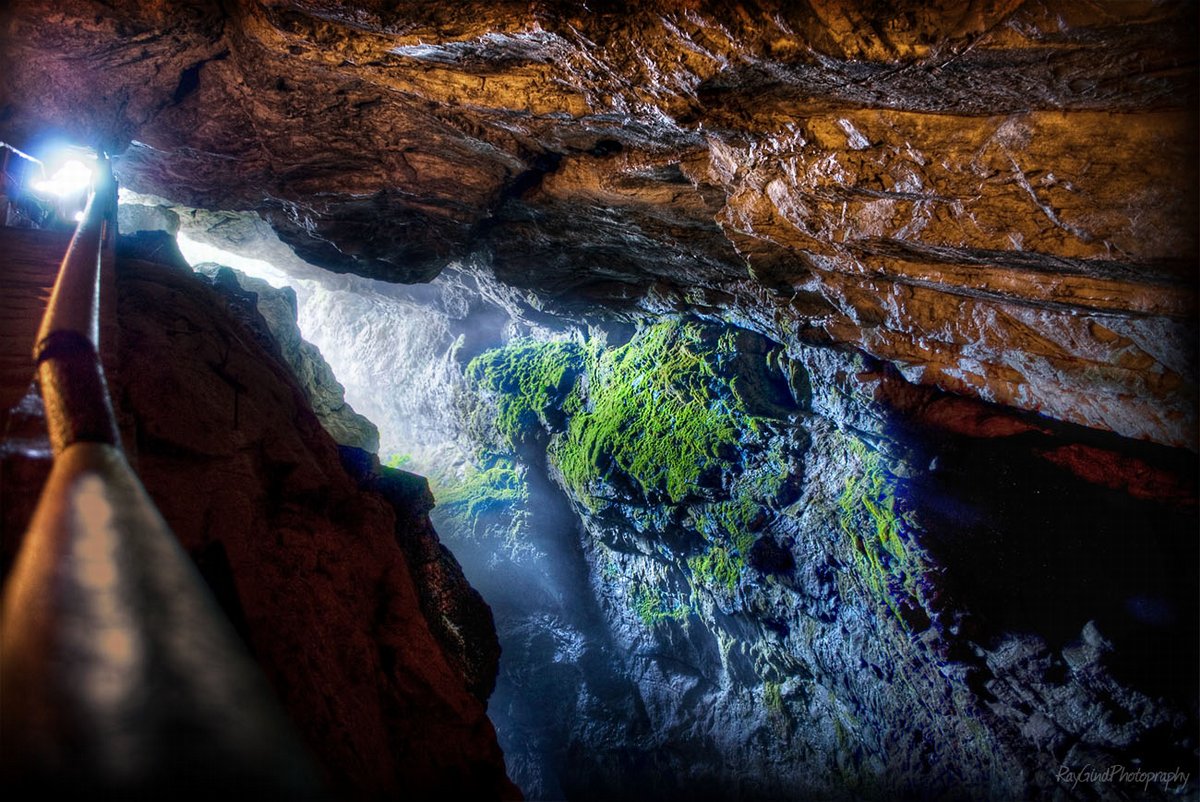
Source: Deviant Art
Let me tell you that caves are many in Bulgaria. But few leave an impression like the Devil's Throat Cave in the Western Rhodopes.
It bears this name because it's supposed to be shaped like the devil's head (although I couldn't really see it). But that doesn't really matter.
The best part of the cave?
Not only is there a waterfall flowing down the "throat" of the cave: there is also an underground river. Apparently, nothing that was carried by the river ever comes back on the other side. Probably lost in Hell.
47. Scared of the Devil? Look into the Eyes of God instead!
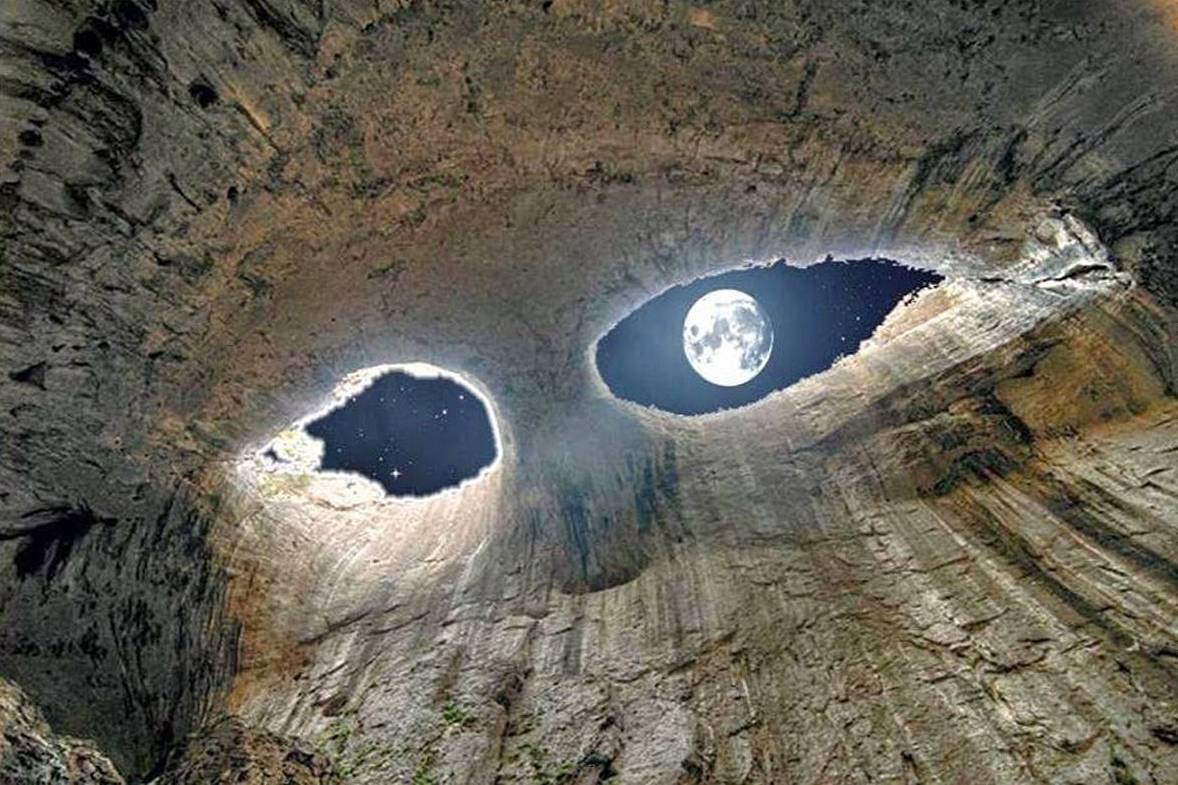
Source: Feel The Planet
In the north of Bulgaria, Prohodna Cave lets you lean to the light side. Two eye-shaped holes in the rocks give the impression that God himself is looking through the cave. If you believe that sort of things.
Even if you don't, I guarantee that the cave is a very picturable spot. History buffs will once again appreciate the remains that stand as evidence that the place was inhabited thousands of years ago.
Although I didn't try it there, Prohodna is apparently a popular destination for bungee-jumping. Take a leap of faith!
48. Dive into the mysterious Thracian civilization in Perperikon
When I watched the TV series "Spartacus", I learned that the gladiator who led the slave uprising over 2000 years ago was Thracian. That's why I wanted to visit this amazing archeological site.
You may be sick of all this history stuff, but hear this:
The Thracians used to practice a ritual involving fire dancing. And this ritual is still practiced today.
Now here's my tip to get the real experience:
Knowing that tourists are attracted to this sort of exhibitions, some cities have organized representations. But that's not what you want to see. Look for small villages where they practice Nestinartsovo (the fire dance) the same way as the Thracians did. That's the real thing.
And don't forget to ask for the reason of the ritual! Hint: it involves incest...
49. Go for a stroll on Ivan Vazov's ecopath
I bet you will hear about the "Patriarch of Bulgarian literature" during your stay. At least you will if you visit Bulgaria the right way!
The writer of “Dyado Yotso gleda / Grandpa Yotso watches” found his inspiration hiking the path that starts no further than an hour away from Sofia.
In the end, you might not really care about who walked there before you. But the Skaklya waterfall that you'll come upon on the way is worth it. At the top, you'll reach the small village of Zasele at the top.
Bulgaria is full with ecotrails that are perfect for explorers who want to travel responsibly and see the beauty of the country. Along with Negovanska, it's one of my favorite hikes in Bulgaria!
50. Try wild camping in Irakli
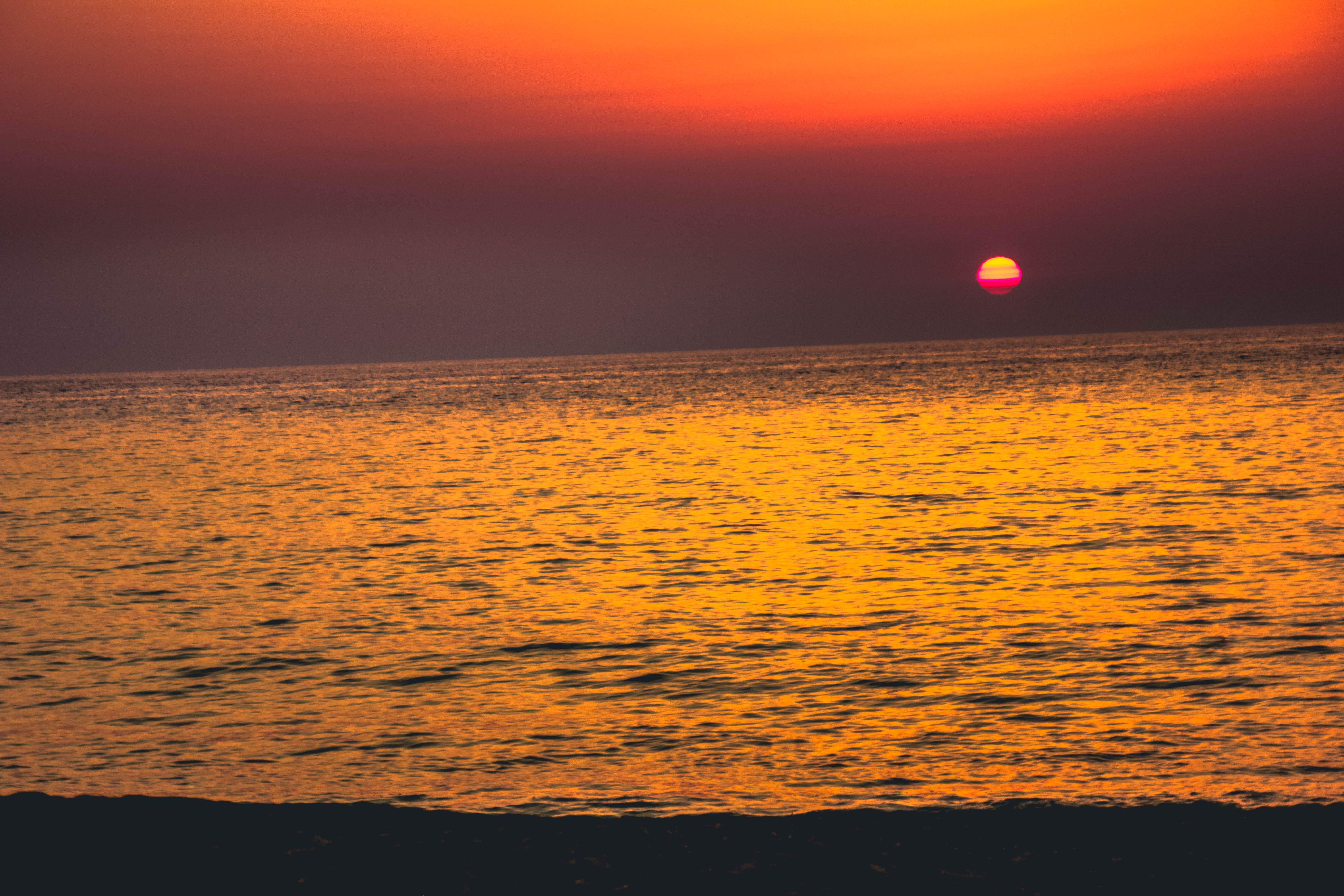
As a budget traveler, I try to save as much money as I can when traveling. That includes cutting accommodation costs. While Bulgaria counts tons of great cheap hostels and Couchsurfers, I really love that wild camping is also an option.
The beaches of Irakli and Vaya, between Obzor and Nessebar, are PERFECT for that. Just like Veleka beach in Sinemorets (further south, close to the border with Turkey), a river flows into the sea, meaning that you can swim both in the river and the Black Sea!
While I strongly recommend that you go to Sinemorets as well, I didn't see any wild campers there. In Irakli, several travelers settle down on the sand with their tent. I did and let me tell you that the sunrise was amazing!
My tip to go there the right way, or what not to do:
There is a camping close by and it might be tempting to stay there, but you shouldn't. First, you'll have to pay for it. Second, you won't sleep on the beach. Third, it's packed and everyone lives close to one another. If you worry about shower and toilets while wild camping in Irakli, rest assured: there are toilets and a shower on the beach!
Bonus tip to visit Bulgaria the right way
Talk with the locals, go and meet them, even if you don't speak the language. They are very welcoming and friendly. Plus, it's the same everywhere: you can read about a country as much as you can, the best hacks will always come from the locals themselves!
Final words on Visiting Bulgaria
My friends here told me that I've seen more places in Bulgaria than the majority of the people who live here.
I have seen a lot indeed during my stay here with the ClaimCompass team, helping people get money out of their delayed, canceled or overbooked flights. And I've loved what I've seen. Yet, there is still much more that I need to visit!
Hopefully, these tips to visit Bulgaria the right way will make you want to come and check out what this beautiful and underrated country has to offer.
To be clear: way more than just cheap drinks and sandy beaches!!
Delayed flight? Canceled plane? You could get a compensation for that!
